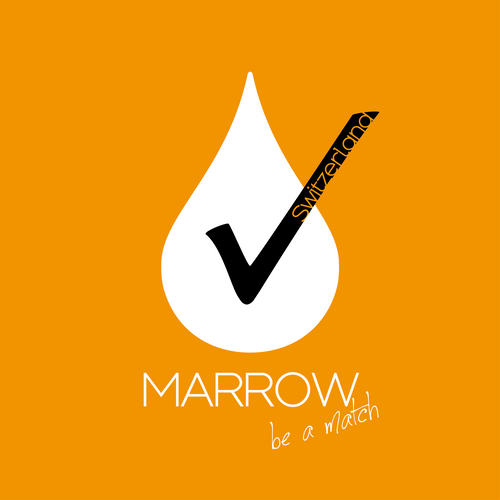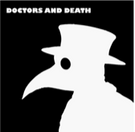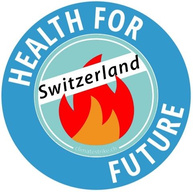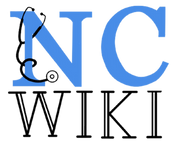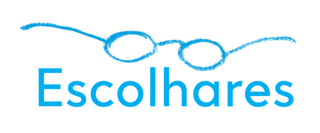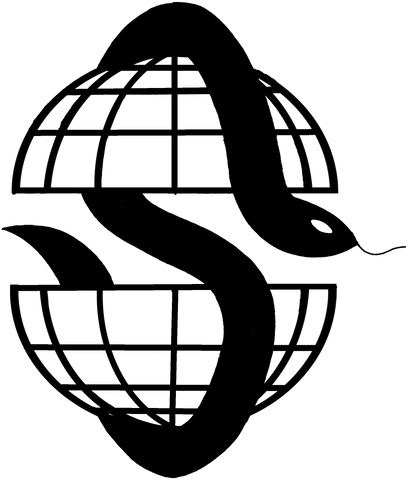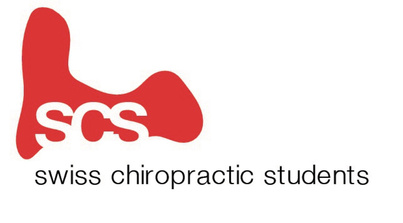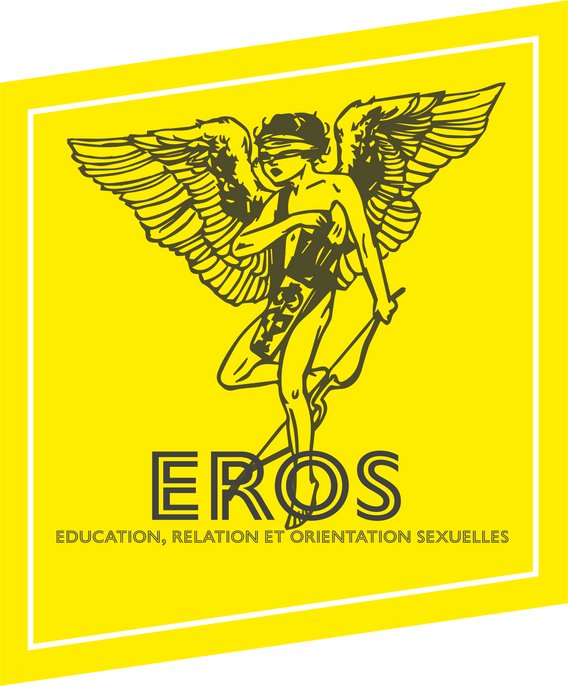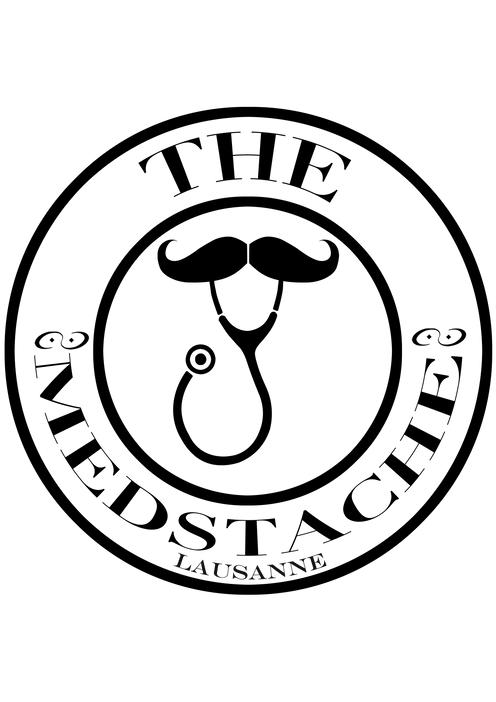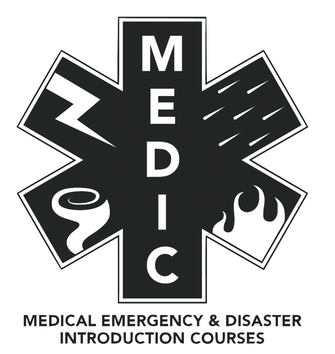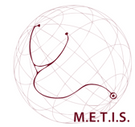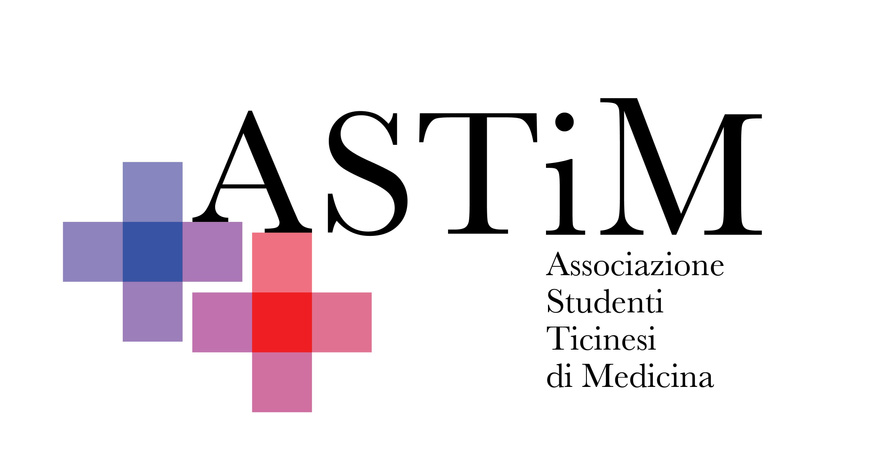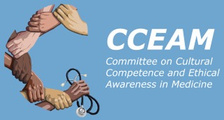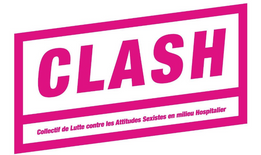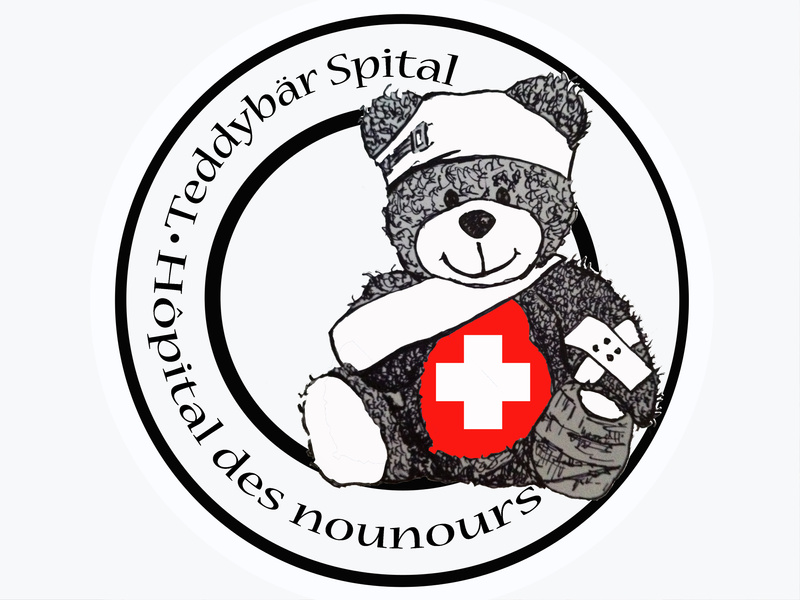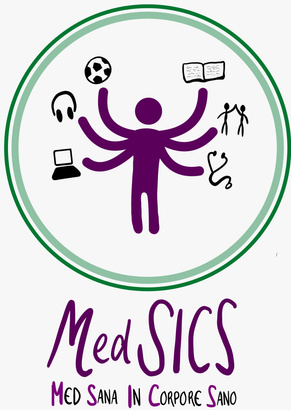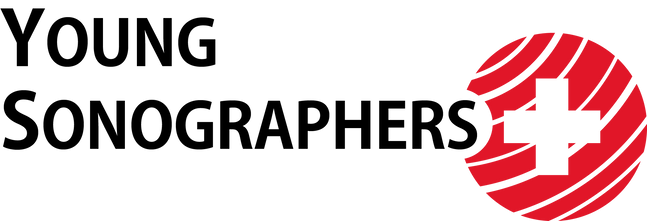FOCUS

SMSC ZÜRICH 2024
KILLERS IN MEDICINE
SWISS
MEDICAL STUDENTS'
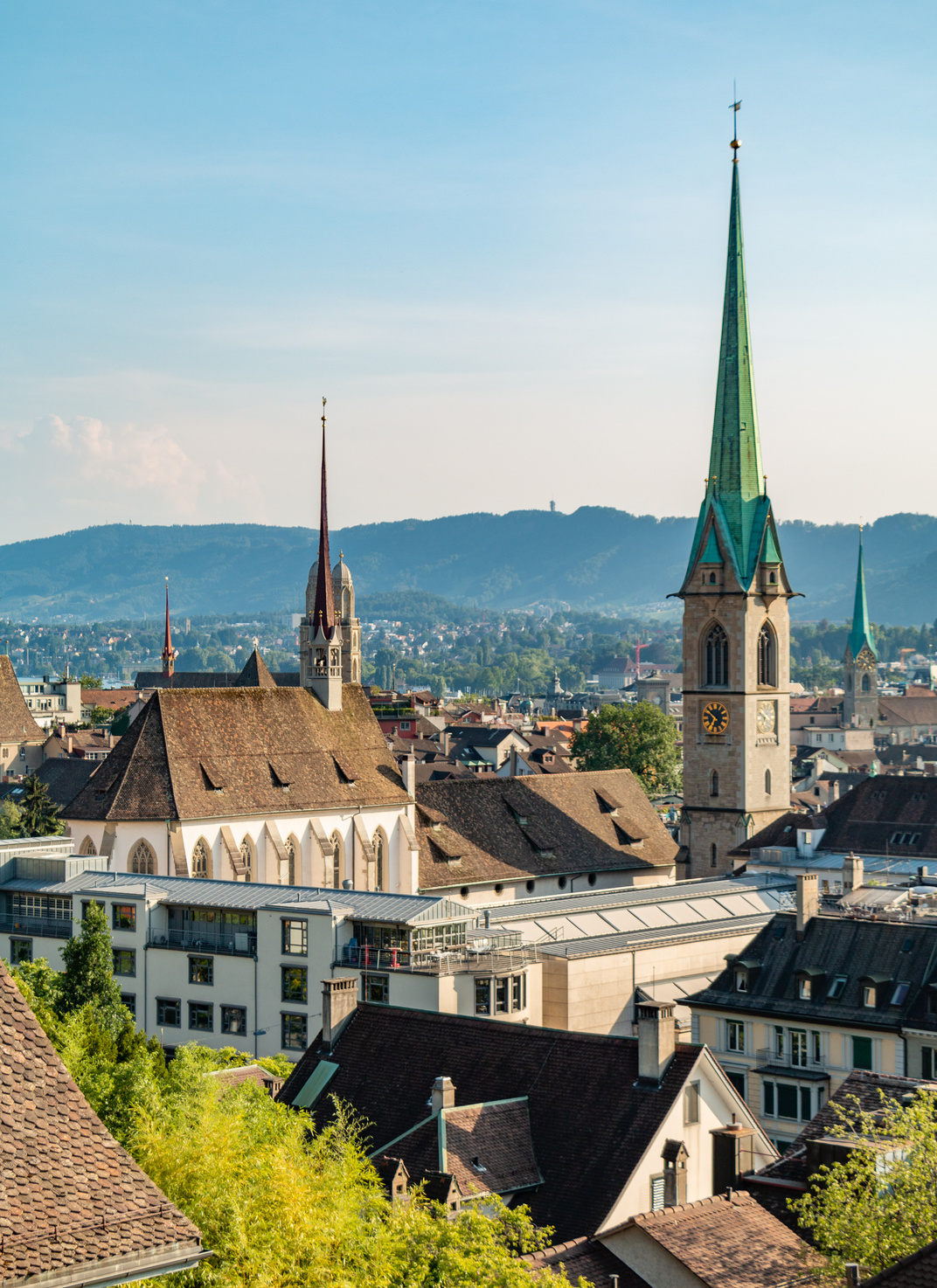
NATIONAL JOURNAL
eDITION 24
april 2024
impressum
Content
Head of journal
Bansi Butani | Vice President for Communication 2023-2024 (VPC)
Publisher
Swiss Medical Students’ Association
swimsa
www.swimsa.ch
contacts
General | contact@swimsa.ch
Publications | vpc@swimsa.ch
cover photo
Zürich Church Towers by Bruno Coelho
© Portions of the NJSMS may be reproduced for non-political and non-profit purposes mentioning the source provided. Notice swimsa cannot accept any liability. The opinions expressed in this journal are those of the authors and do not necessarily reflect the views of swimsa. Some of the photos and graphics used in articles are property of the authors. We have taken every consideration not to violate their rights.
agenda
April 5th - 7th, 2024
May 4th 2024
SMSC Zürich
DV/AD (Delegate’s Assembly), Basel
01
swimsa
02
03
06
14
16
22
25
28
31
33
35
37
39
41
43
47
50
51
54
55
56
what is swimsa?
The Swiss Medical Students’ Association (swimsa) commits itself to creating a sustainable, healthy society and motivates medical students through innovative engagement to become better doctors.
swimsa is the voice of over 10,000 medical students by the membership of eleven medical students’ associations, represented on a national level via seats in health organizations such as the FMH and the BAG/ OFSP, as well as on an international level as part of the International Federation of Medical Students’ Associations (IFMSA).
With currently 21 associated members, swimsa helps to shape public health – by teaching sex education in highschools, destigmatizing mental health or working in developing countries. Additionally, swimsa enables students to complete international exchanges in clinical (SCOPE) as well as in research (SCORE) fields.
With the Commission on Medical Education, swimsa plays an active role in shaping medical education in Switzerland and is aspiring to be the link between education and work, students and professionals, across all fields of health care.
Twice a year, swimsa organizes the Swiss Medical Students’ Convention (SMSC), which brings together over 400 Swiss medical students from all universities and allows them to network and bond over interesting subjects.
a big thank you to our partners and sponsors


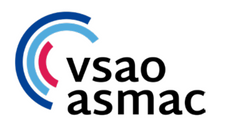
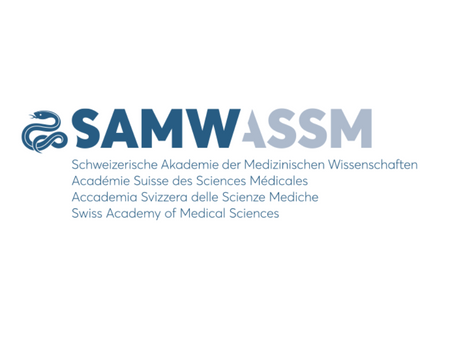
02
swimsa
executive board
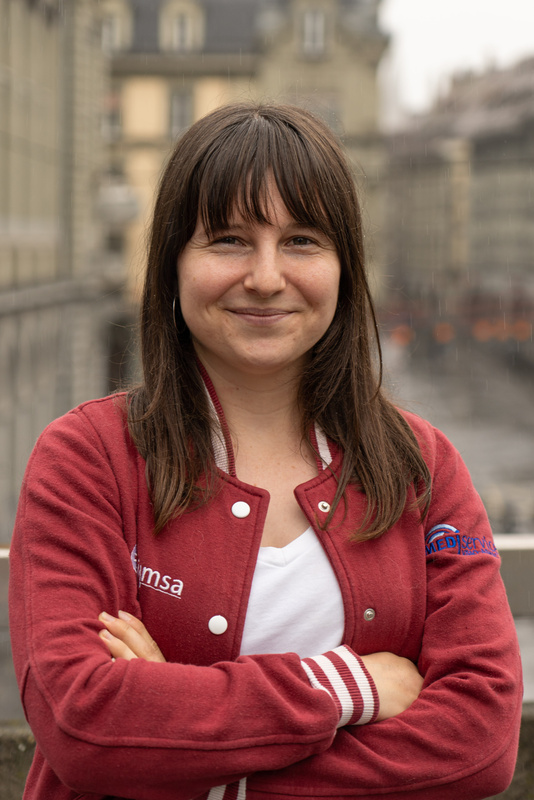
Valeria Scheiwiller
president
The president is the heart of the EB. They coordinate the EB internally and are also the first representation towards externals.
Mélanie Imhof
General secretary
The GS contributes to our professional outlook internally and externally as the first contact person for any inquiries. In addition, the GS manages all administrative aspects within the organization.
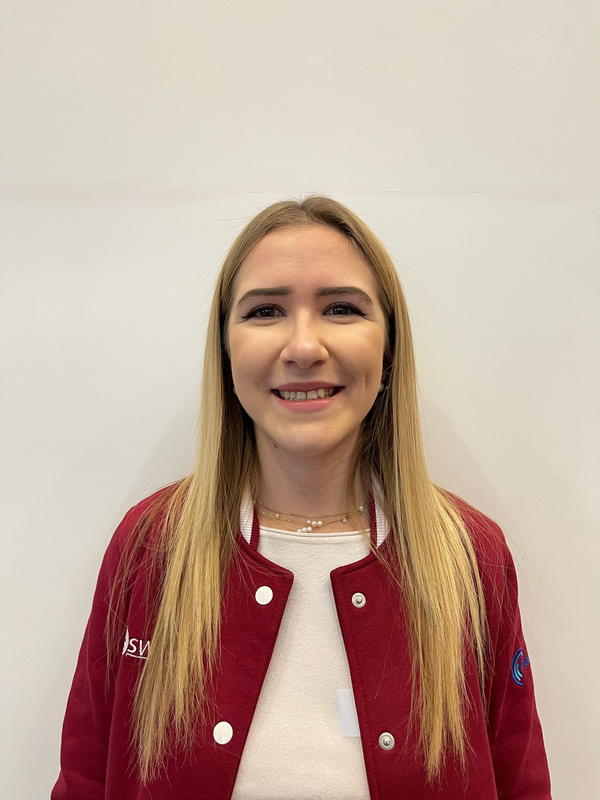
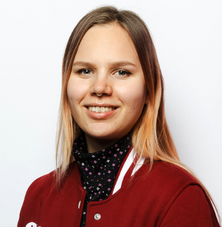
Lenke Kis
Treasurer
The treasurer manages the finances of swimsa. They ensure that swimsa’s invoices are sent out on time and the amounts owed are paid. Furthermore they are responsible for the reimbursements of expenses and the management of the swimsa Fonds.
03
swimsa
Lara Serban
VP for medical education
swimsa cooperates with many political organizations and represents the opinion of medical students to them. These are developed in the Commission on Medical Education (AK/CoFo). The AK/CoFo discusses concrete topics, decides on measures and writes statements. The VPA chairs the AK/CoFo.
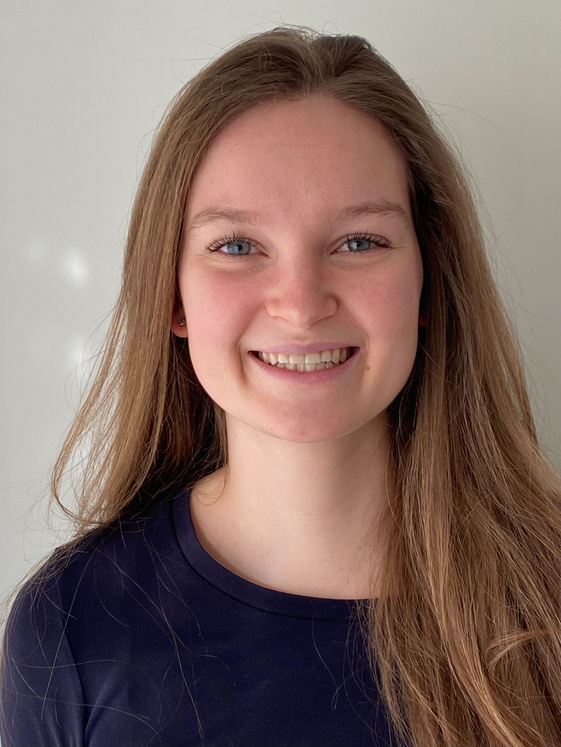
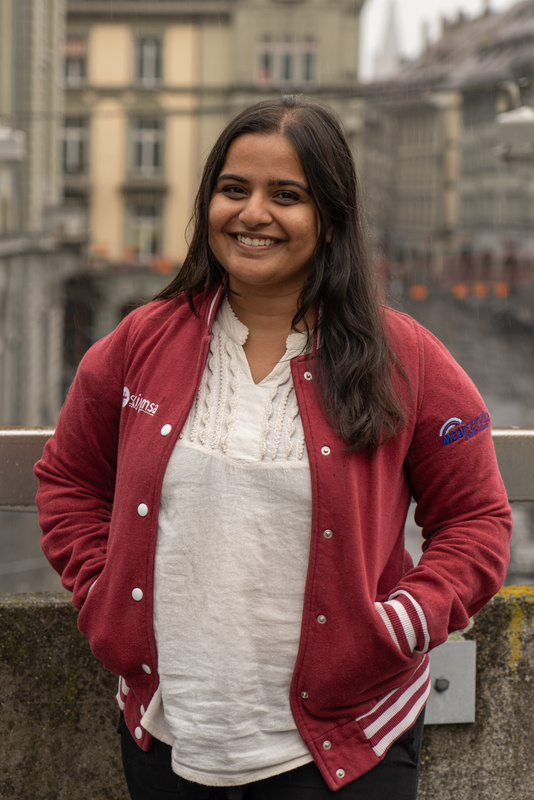
Bansi Butani
VP for communication
The VPC is in charge of swimsa’s representation on social media, the website, the newsletter (swimsagram) and the swimsa journal. They also maintain the adherence to swimsa’s corporate identity.
Clara Ehrenzeller
vp for external affairs
The VPE focuses on nurturing swimsa’s established relationship with partners and sponsors and representing the interests of swimsa to our partners and the general public.
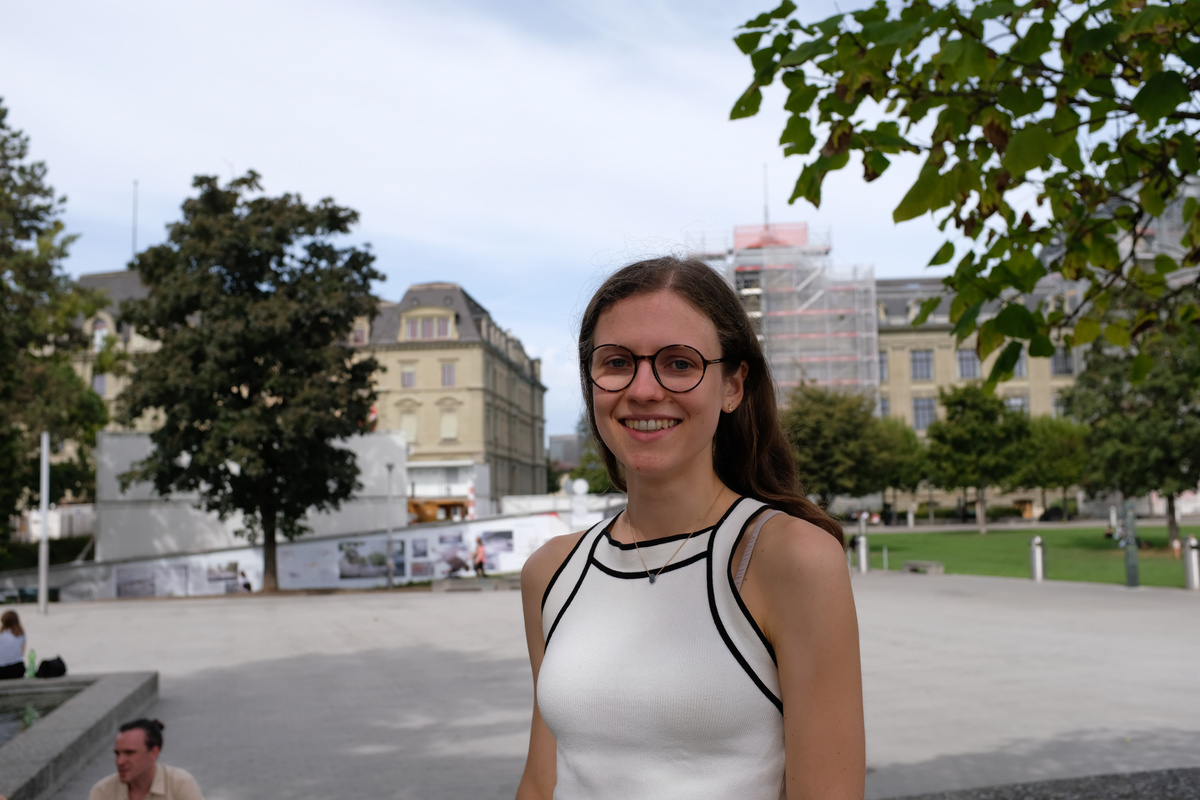
04
swimsa
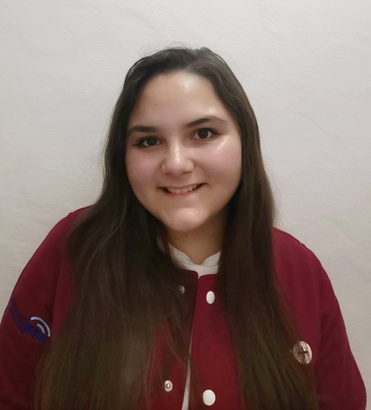
Danaé Bucher
vp for internal affairs
The Vice-President for Internal Affairs has a finger on the pulse for the needs of full and associate members of swimsa. They inform the member organizations about current events and the work of swimsa and are responsible for the internal communication.
Jakub Novotny
vp for exchanges
The Vice-President for Exchanges is the chairperson for swimsa Exchanges, the student exchange program of swimsa. They work internationally within IFMSA and collaborate with Exchanges programs from all over the world. The VPX should have prior experience with Exchanges.
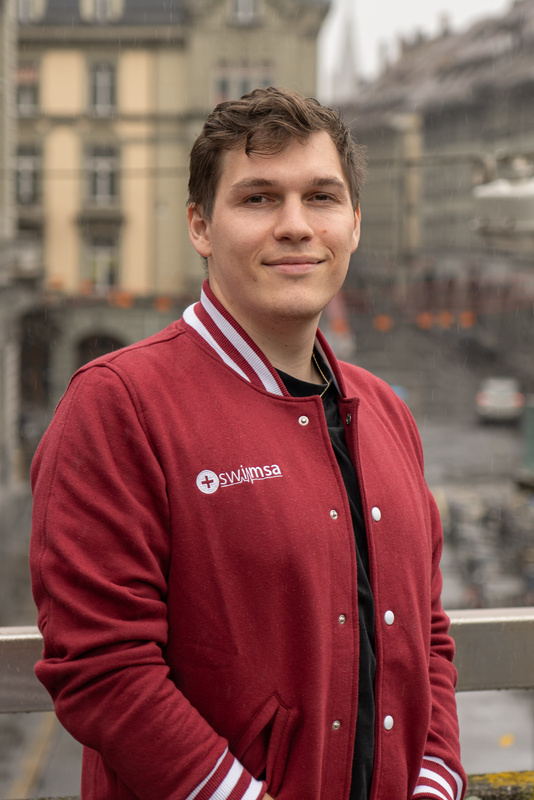
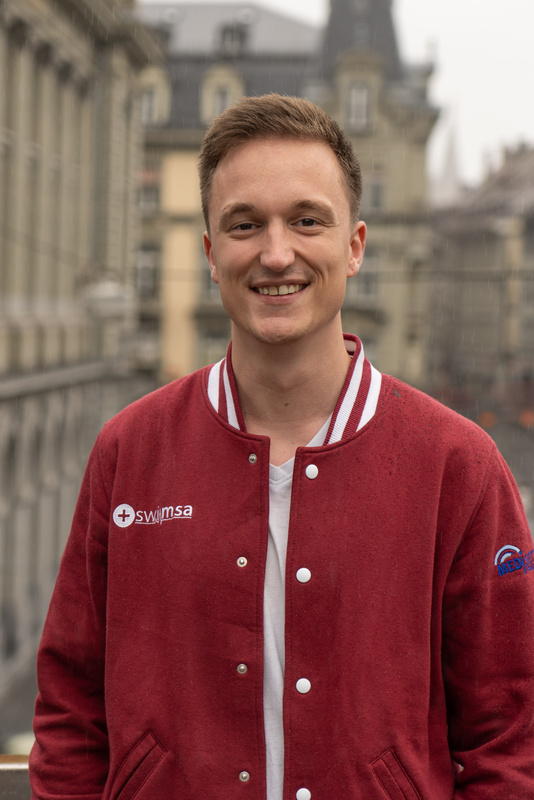
Kevin Brunold
vp for global affairs
The Vice-President for Global Affairs advocates for swimsa in the International Federation of Medical Students’ Associations (IFMSA) and has prior experience within IFMSA. They are responsible for the representation of swimsa at international conferences.
05
swimsa
national officers
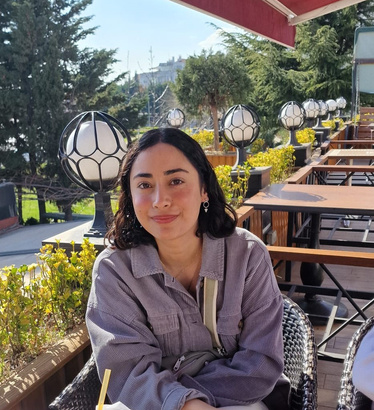
Jennifer To
national exchange officer for outgoings
The NEO-Out coordinates all international clinical exchanges for Swiss medical students going abroad.
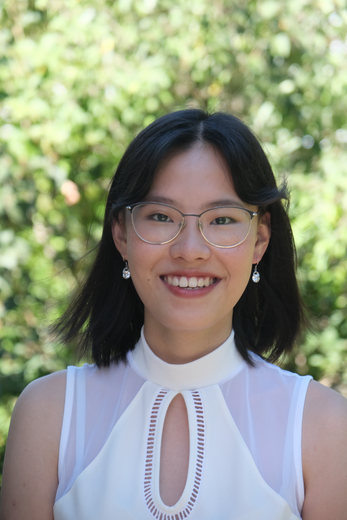
Rameesa Khan
national exchange officer for incomings
The NEO-In checks the applications of international students who want to do a professional exchange in Switzerland and distributes them to the local committees.
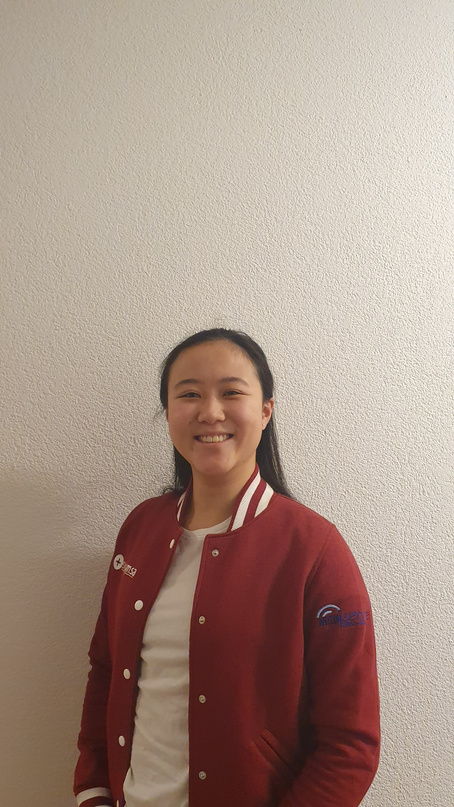
Boya Zhang
national exchange officer on research exchanges
The NORE is responsible for the research exchange in Switzerland and coordinates the exchanges of Incomings and Outgoings.
06
swimsa
Clémence Aellen
national officer on sexual and reproductive health and rights including hiv and aids
The NORA supports and coordinates the collaboration of swimsa’s associate members that are involved in sexual health. They are also responsible for the CoSH (Committee on Sexual Health).
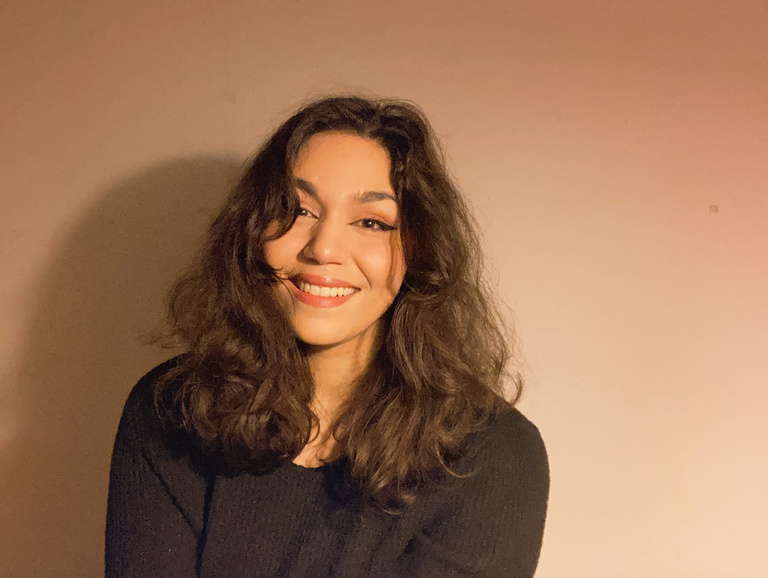
Julia Zink
national officer on human rights and peace
The NORP represents swimsa in the field of Human Rights and Peace on a national and international level. The NORP is also tasked with representing swimsa‘s projects and commitments in this field.
07
swimsa
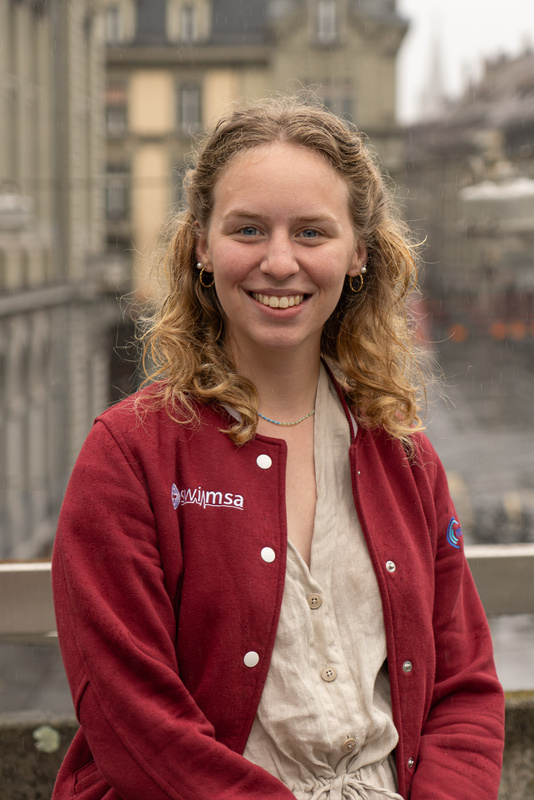
Nadia Chaib
national public health officer
The NPO represents swimsa, its projects and commitments in the area of Public Health on a national and international level.
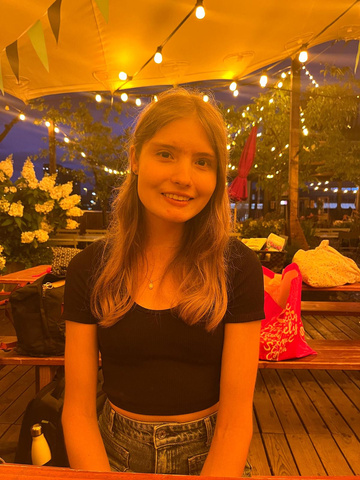
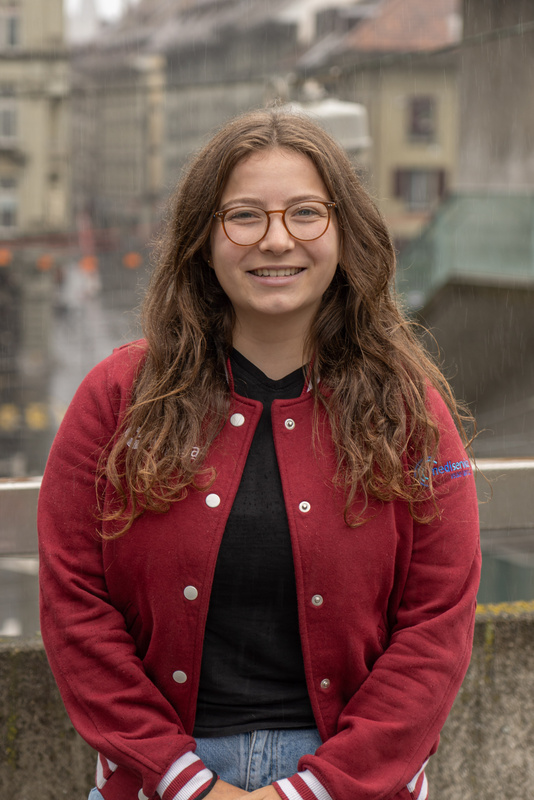
Romain Landry
National officer on medical education
NOME acts as a bridge between IFMSA and national medical education initiatives, coordinating activities and fostering international collaboration among medical students in Switzerland. Its key missions include organizing national events, supporting AK/Cofo delegates, promoting member engagement in medical education, and representing Swiss medical students globally through partnerships with SCOME.
Annina Biri
national officer on capacity building
he NOCB is responsible for the training activities swimsa provides to its internals and members and represents the link in this area to the IFMSA.
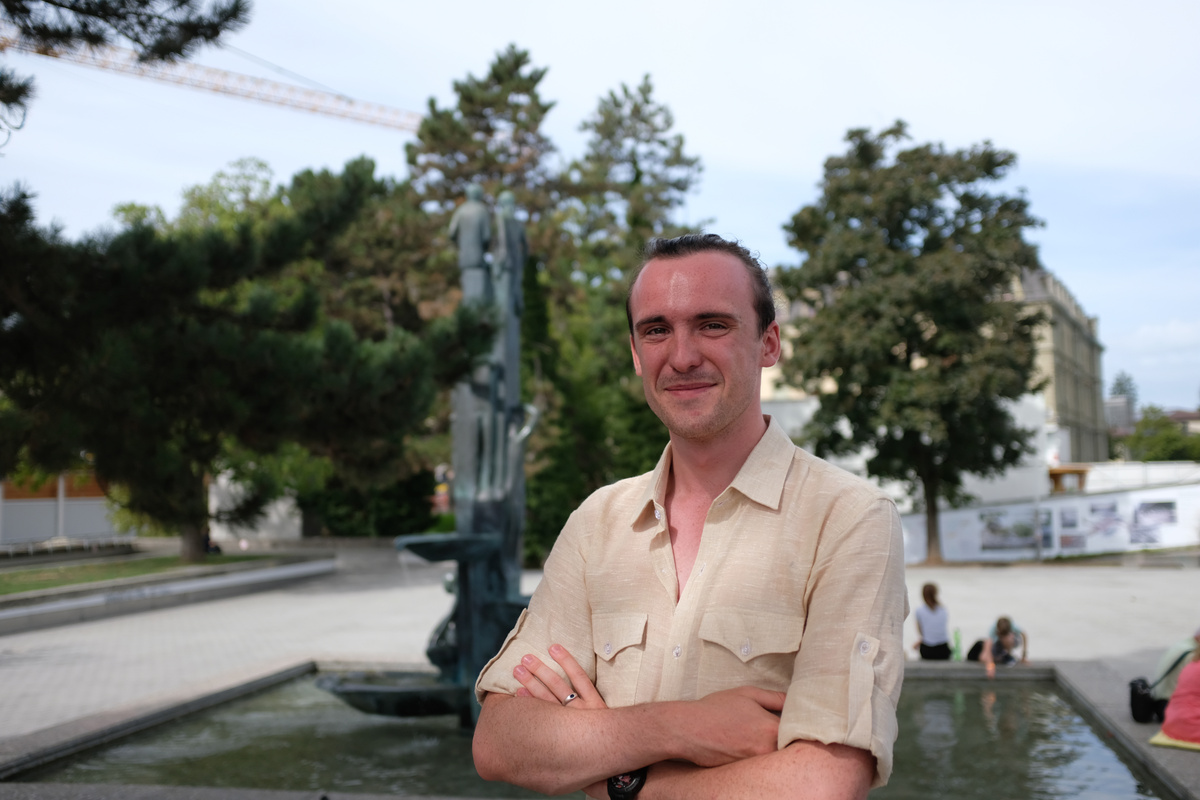
08
swimsa
supervising council
The SVC oversees the work of the executive board and makes sure the bylaws are being adhered to.
Pascale Meyer
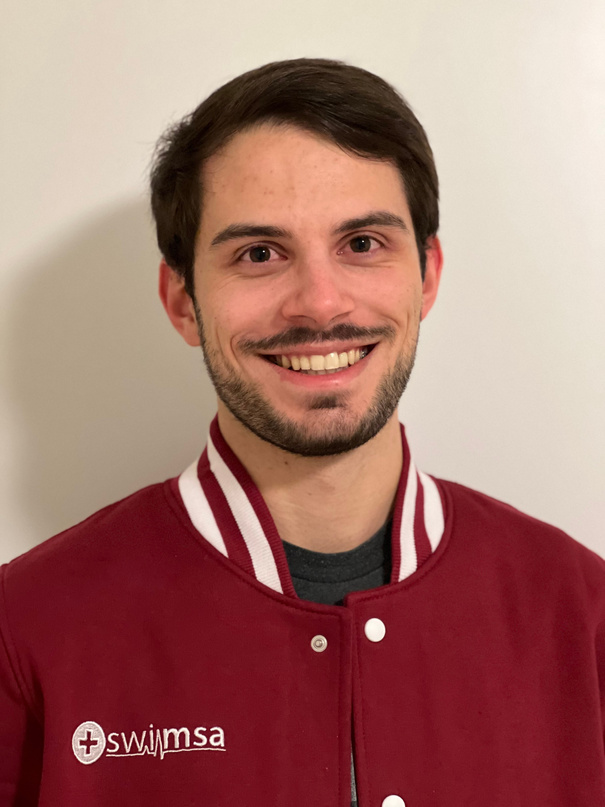
Luca Siragusa
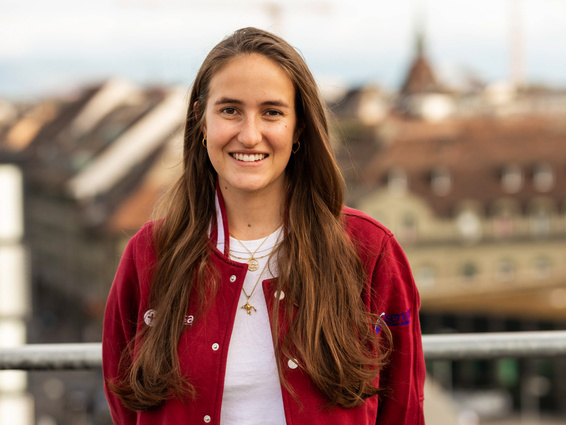
Sven Stalder
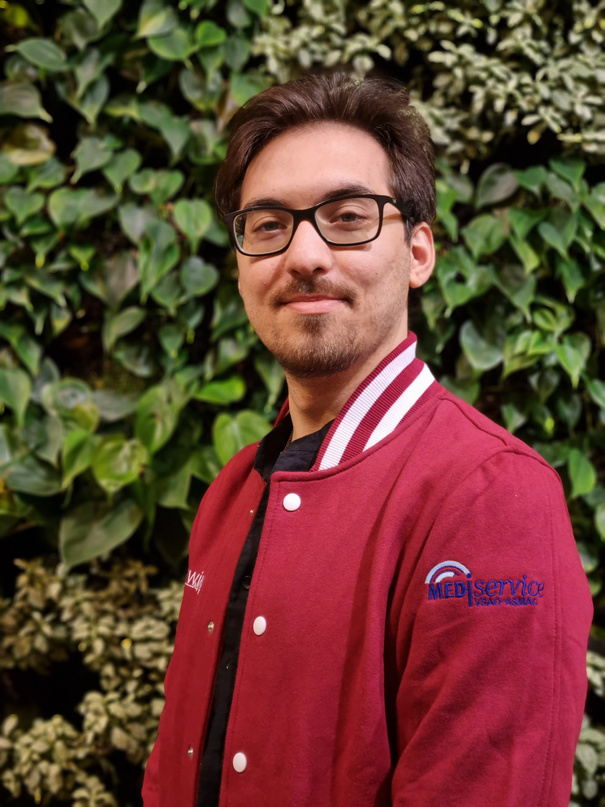
09
swimsa
liaison officers
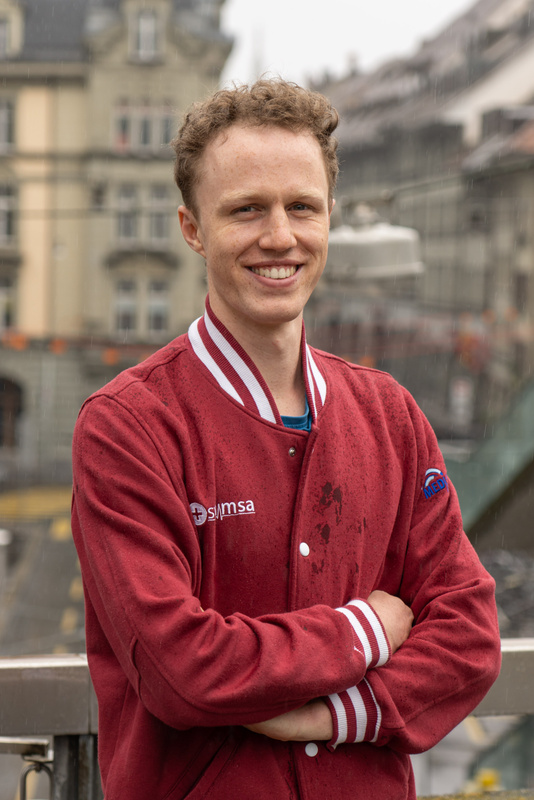
Luc Lutz
Lo-PH
This LO sits at the FMH's Planetary Health working group, which meets 4 times a year, whose aim is to implement within the FMH the strategy for Planetary Health promulgated in December 2021. More generally, the LO is the competent contact person for planetary health questions within swimsa.
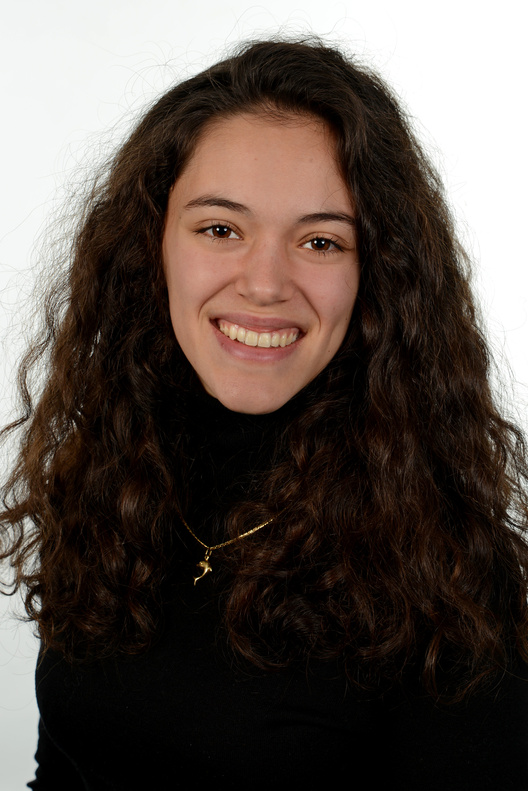
David Siegrist
Lo-mebeko
The LO-MeBeKo represents swimsa’s views and can vote on behalf of swimsa in the extraparliamentary Commission of the BAG/OFSP, which mainly discusses the recognition of foreign diplomas as well as the federal licensing exam four times a year.

Loredana Mitruccio
LO-VSAO
The LO-vsao/asmac represents swimsa’s views and can vote on behalf of swimsa in the monthly “Geschäftsausschluss/ Comité directeur” and the bi-annual “Zentralvorstand/ Comité central” in the vsao, which is the organisation representing the “Assistenzärzt:-innen and Oberärzt:innen/ médecins assistant(e)s et chef(fe)s de clinique”
10
swimsa
Remus Rutz
Lo-bag
The LO-BAG/OFSP represents swimsa’s views and can vote on behalf of swimsa in the plattform “Zukunft ärztliche Bildung/Avenir de la formation médicale”, which collects all stakeholders in medical education four times a year.
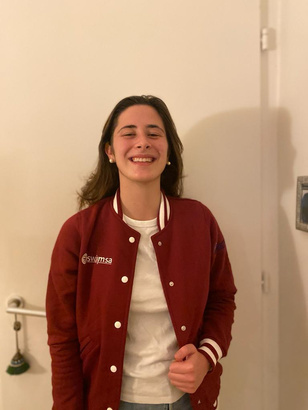
Mohammed Said
lo-vss
The LO-VSS represents swimsa within the Swiss Students Union and connects the two organizations. They attend the members’ council on Wednesday afternoons once a month and attend the Delegates’ Assembly.
11
swimsa

Chloé Rosenfeld
LO-FMH
The FMH is the association of swiss doctors, which gathers representatives of cantons and all medical specialties. The LO-FMH attends the “Ärztekammer”/”Chambre médicale” twice a year and represents swimsa’s views.

swimsa internals
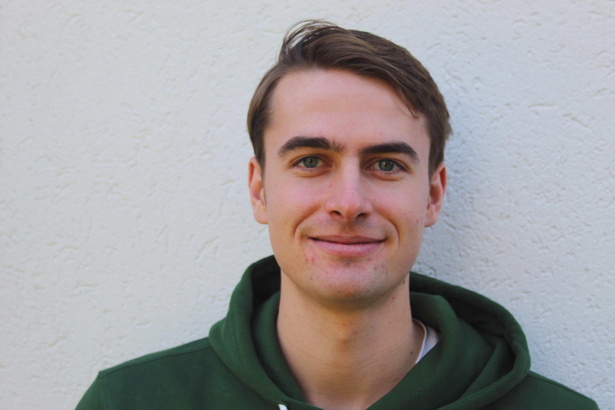
Samuel Donovan
neo-in assistant
The NEO-In Assistant supports the NEO-In in coordinating the international students coming to Switzerland for an exchange (SCOPE Exchanges).
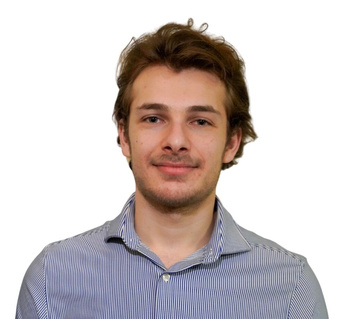
Michael Schwarz
neo-out assistant
The NEO-Out Assistant supports the NEO-Out in coordinating international clinical exchanges for Swiss medical students.
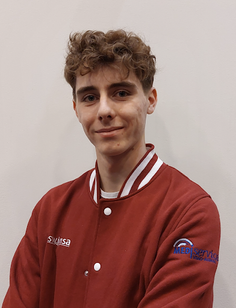
Samuel Gurray
nore assistant
The NORE-Assistant supports the NORE in coordinating the international students coming to Switzerland for an exchange (SCORE Exchanges).
12
swimsa
Diogo Zimmermann
national exchanges treasurer
The National Exchanges Treasurer manages the finances of Exchanges in collaboration with the VPX.
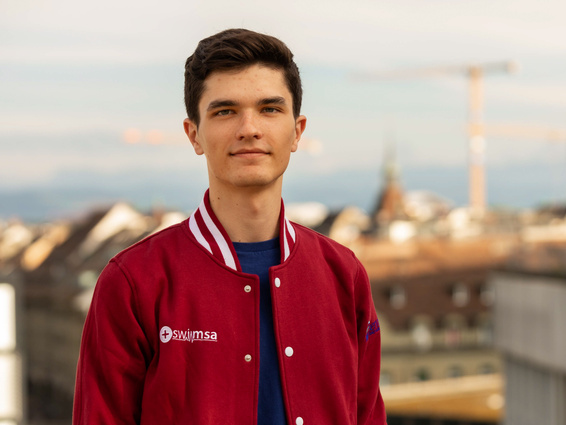
Giulia Cavaliere
Website coordinator
The website coordinator is responsible for the swimsa website (www.swimsa.ch) and keeping it up-to-date with the latest information about upcoming events and is the to-go spot for any information you may require about the activities of swimsa.
13
swimsa
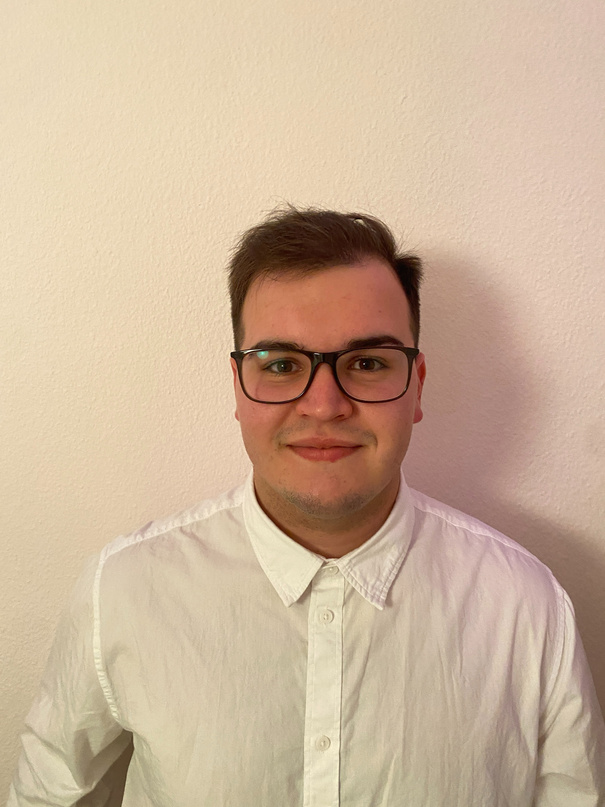
Marc Reynaud de la Jara
advocacy board coordinator
Advocacy is a very important part of swimsa, so they coordinate and manage Advocacy Board meetings, in order to advocate for swiss medical students
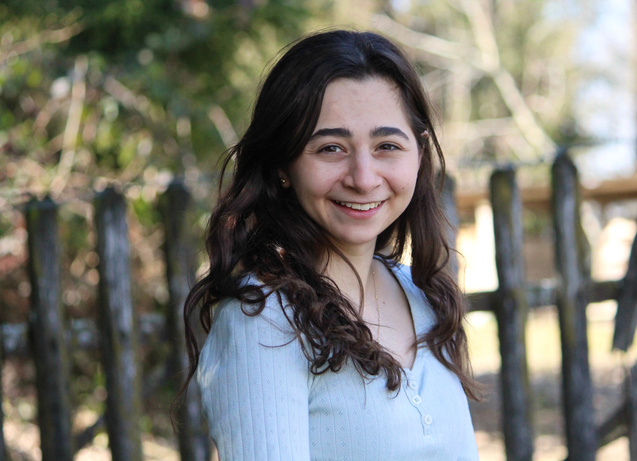
letter from the vpc
Dear swimsa family,
Can you believe it’s been 8 months already? Time really does fly when you're having fun (and working hard!). As we pack up the winter sweaters and head into the regrowth of nature in spring, it's the perfect moment to pause and take stock of how far we've come together.
From the moment we kicked off this term, the energy and dedication from each person has been nothing short of incredible. Whether one is a seasoned swimsa veteran or a fresh face, each person’s passion has been the driving force behind everything we've achieved so far.
We've tackled challenges head-on, learned valuable lessons, and grown in ways we never imagined. But hey, that's what makes this journey so exciting, right? Every hurdle is just another chance for us to flex our collective muscles and come out stronger on the other side.
Looking forward, I couldn't be more pumped about what's in store for us. We've got some seriously cool ideas brewing, and I can't wait to see them come to life with your help. Whether it's cooking up new projects, honing our skills, or simply hanging out and sharing ideas, there's no shortage of awesome stuff on the horizon.
So, let's keep the momentum going, shall we? Stay connected, stay engaged, and most importantly, keep being your awesome selves. Drop us a line on social media or shoot us a message anytime – we're always here to chat.
Thank you to all for being the pioneers of change. Together, there's no limit to what we can achieve.
Here's to crushing it the rest of this term and beyond!
In the name of swimsa 23/24,
Bansi Butani [VPC]
14
swimsa
subscribe for updates!
instagram
facebook

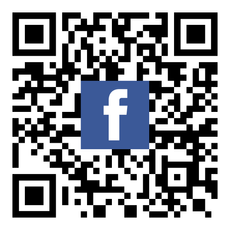
killers in
medicine
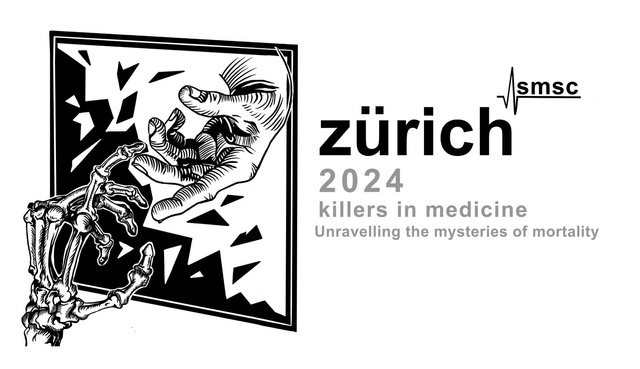
The Swiss Medical Students' Convention (SMSC) is the national convention of swimsa for all medical students in the whole of Switzerland. This convention took place for the very first time in 2005 in Bern. Since 2007 it is held twice a year (once per semester). Each time the congress is organized by a different medical faculty, which alternate on a rotating basis. The focus of the upcoming SMSC is Killers in Medicine and mysteries of mortality, held from 5th-7th April 2024 in Zürich.
With interesting lectures, workshops and debates, topics which are neglected in the university or which are currently topical in health policy are placed at the forefront. Projects and student bodies are given the opportunity to present their activities and inspire their fellow students. This event is intended to give medical students an opportunity for personal exchange, education and networking. The congress aims to broaden horizons and show that studying medicine is more than just exams.
15
swimsa
‘Delving into the darker side of medical science, this year's theme, "Killers in Medicine," aims to uncover underestimated and often overlooked causes of death. Our exploration touches on broader aspects, including the unknown realms of physiology, the molecular mechanisms of aging, the impact of psychiatric diseases on mortality, and the intriguing intersections of medicine with forensics and law in cases involving human harm and murder. Our venture aims to shed light on the multifaceted challenges and complexities of mortality in the field of medicine.
The organizing committee, composed of dedicated students, has worked tirelessly to make this event unforgettable. Their motivation is to inspire the new generation of physicians by giving them a unique opportunity for personal exchange, education, and networking. The SMSC Zurich 2024 aims to broaden horizons and show that studying medicine is more than just theory and exams.
FOCUS
16
swimsa
Olivier Devuyst, M.D., Ph.D is a Full Professor of Medicine at the University of Zurich and holds a joint appointment in Medicine and Nephrology at UCLouvain Medical School, Saint-Luc Academic Hospital in Brussels and ETH Zurich. He co-chairs the University's rare diseases program, focusing on inherited kidney diseases.
Dr. Devuyst's research involves a multi-level approach, combining disease models, deep phenotyping, and molecular genetics to understand mechanisms and develop therapeutic options. Notably, he demonstrated the crucial role of water channels (aquaporins) in peritoneal dialysis and contributed preclinical strategies to enhance dialysis efficiency.
He has served in leadership roles, coordinated EU-funded networks, and founded the Working Group on Inherited Kidney Disorders. Dr. Devuyst is a Fellow of the Royal Academy of Medicine, a laureate of international prizes, and an Associate Editor for leading journals in nephrology and rare diseases.
17
swimsa
Prof. Dr. Sebastian Olbrich is the Chief of the Centre for Depression, Anxiety Disorders, and Psychotherapy at the University Hospital of Psychiatry Zurich since 2021. He holds a doctoral and postdoctoral degree from the University of Leipzig, Germany, and completed his rehabilitation at the University of Zurich in 2017, becoming Deputy Chief of the Center for Social Psychiatry.
His expertise lies in electrophysiological research and predictive biomarkers for psychiatric disorders, particularly in the use of electroencephalogram (EEG) patterns and cutting-edge technologies like Deep Learning approaches.
He aims to demonstrate EEG's reliability as a diagnostic marker and its potential in developing more effective psychiatric disease treatments. Prof. Dr. Olbrich has numerous publications on EEG markers' predictive power and a keen interest in translating suicide prevention research into clinical applications. His ongoing work focuses on contributing to improved and innovative psychiatric disease treatment therapies.
18
swimsa
Dr. Collin Yvès Ewald is a Swiss scientist and molecular biologist currently serving as a lecturer at ETH Zurich. He is an associate director of the diseases of aging and regenerative medicine (DARe) group at NIBR, Novartis. The DARe group is focused on elucidating and targeting the molecular mechanisms underlying diseases of aging in developing potential regenerative pharmacological interventions that restore tissue integrity and function.
Previously, he had led the Laboratory of Extracellular Matrix Regeneration, focusing his research on the molecular mechanisms of healthy aging, with an emphasis on the remodeling of the extracellular matrix during aging and longevity interventions.
He completed his bachelor's in molecular biology at the University of Basel and pursued his Ph.D. in Neuroscience and Molecular Biology at the City University of New York, where he discovered a genetic link between Insulin/IGF-1 signaling and Alzheimer's disease. His postdoctoral work at Harvard Medical School highlighted the role of Insulin/IGF-1 signaling in promoting collagen homeostasis during longevity.
19
swimsa
Prof. Dr. med. Stephan Bolliger is a specialist in forensic medicine, serving as the Head of the Division of Forensic Pathology at the Institute of Forensic Medicine, University of Zurich. He established and leads the Forensic Biomechanics research group.
His 2015 habilitation focuses on biomechanical aspects in forensic medicine. Additionally, he is a lecturer at the Swiss Police Institute. In 2009, he humorously won the Ig-Nobel Prize in the "Peace" category for his research on the impact force of full and empty beer bottles.
20
swimsa
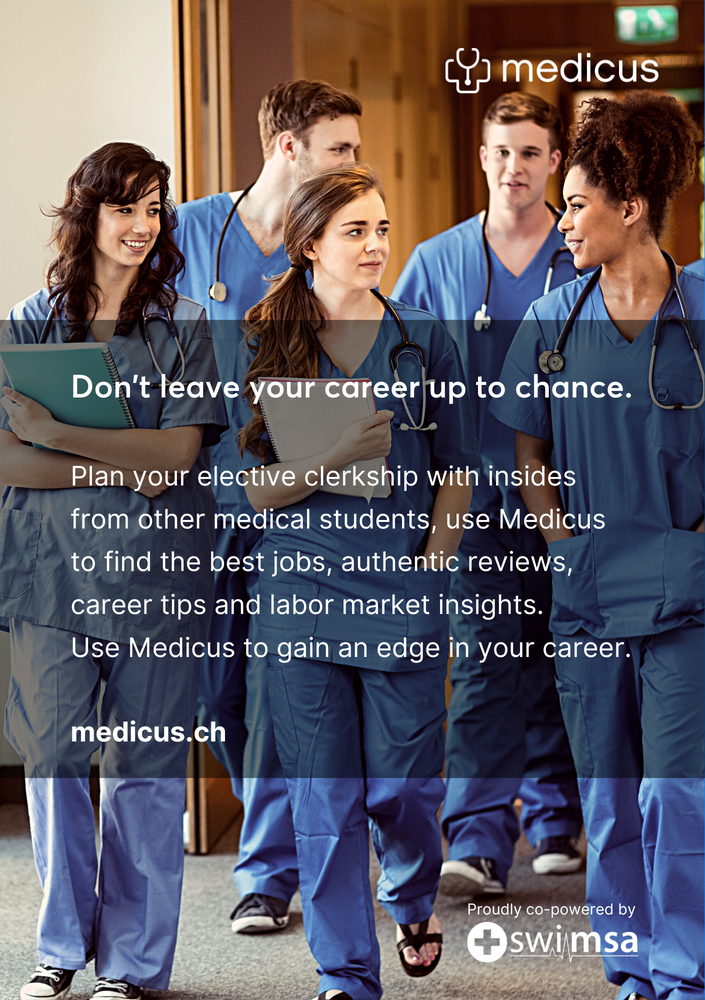
making an impact
Bansi Butani
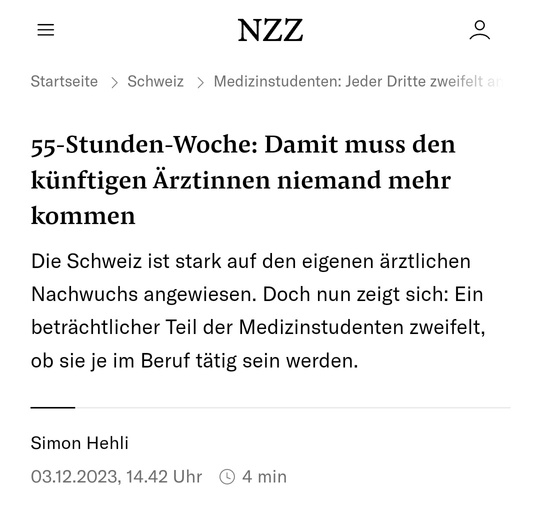
This term, our Advocacy Board held a survey which involved the opinion of 2,300+ medical students all over the country and was co-authored by Valeria Scheiwiller (P), Clara Ehrenzeller (VPE), Rahel Laager, Lara Serban (VPA), Marc Reynaud de la Jara (AB Coordinator), and Luc Lutz (LO-PH). This was then translated to a survey report and a policy paper, which was accepted by the Delegates' Assembly in November 2023!
Based off of this survey, NZZ published an article in collaboration with our President regarding the perspective of students on the ongoing discussion of improving the work-life balance of medical professionals.
This groundbreaking news was then
22
swimsa
picked up by multiple news outlets including but not limited to Tagesanzeiger, SRF, and 20 Minuten, as well as interviews with our President, Valeria Scheiwiller, on SRF 10 vor 10, as well as with our AB Coordinator, Marc Reynaud de la Jara, on RTS Forum.
This was possible largely due to the active participation of medical students all over Switzerland boldly voicing their opinions - loud and clear. Through our powerful voices, which have been united for change, we are the catalysts for a brighter future in healthcare for us all! We can assure you that this is simply the beginning of a very exciting journey ahead and swimsa would like to thank everybody for their support and for filling out the survey!
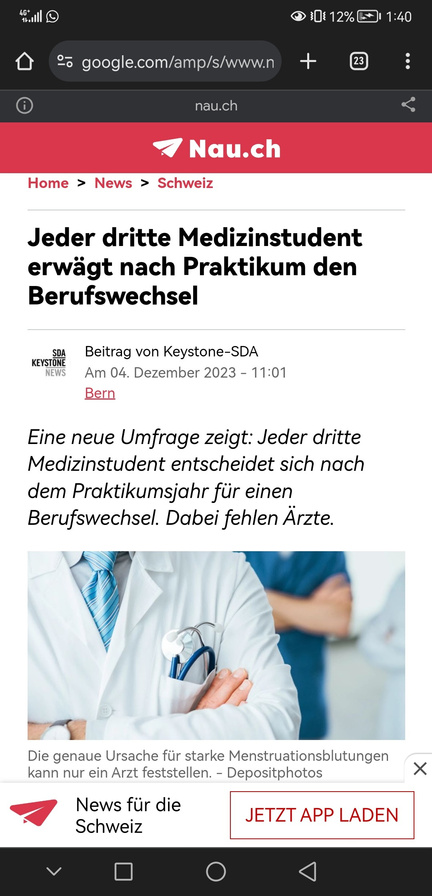
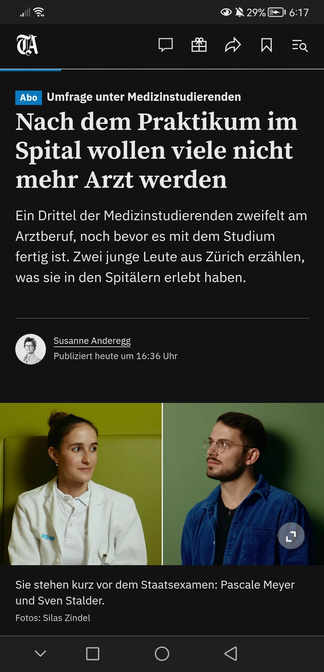
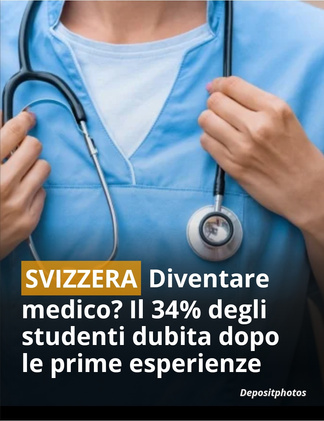
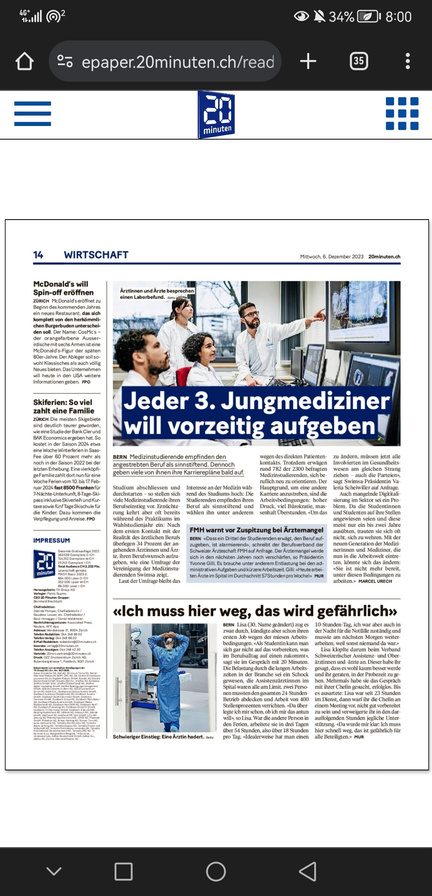
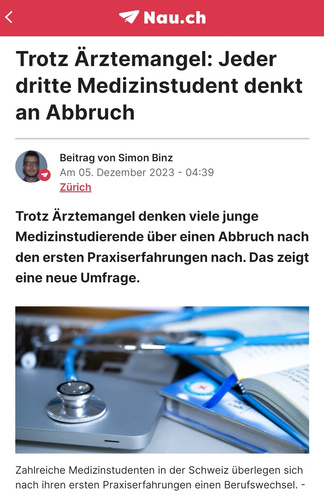
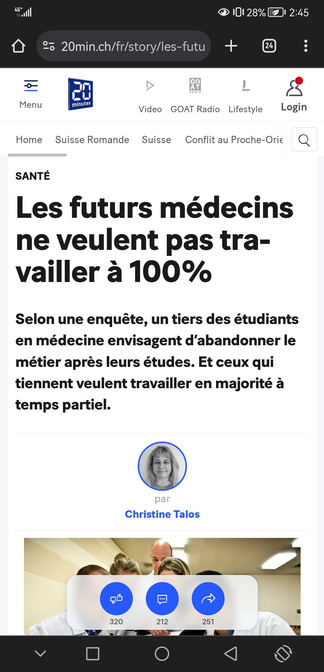
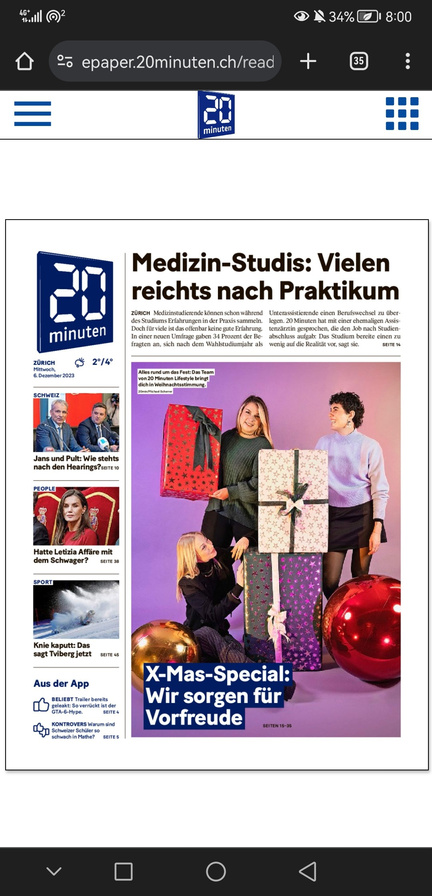
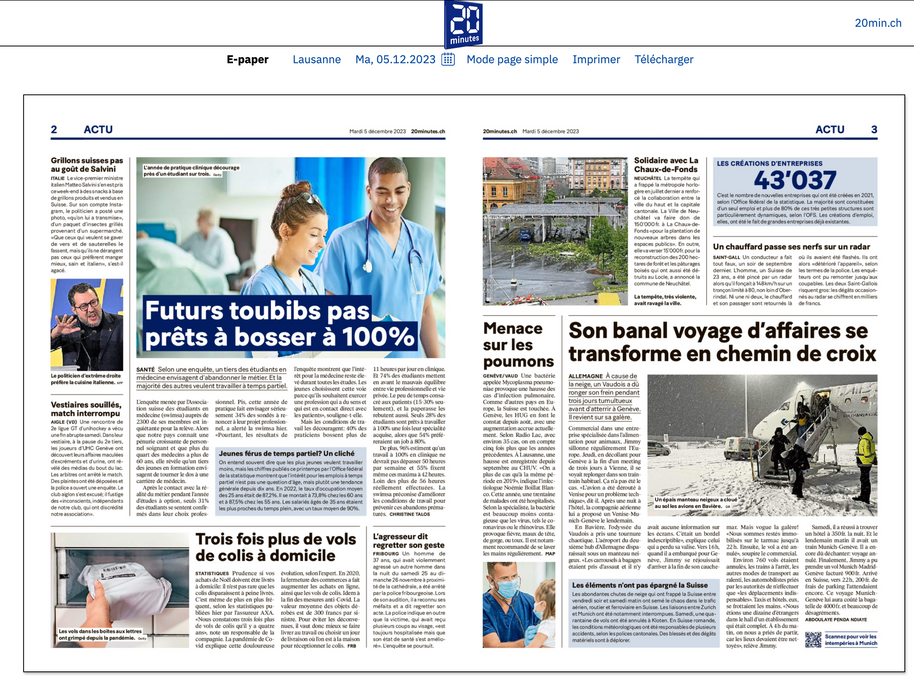
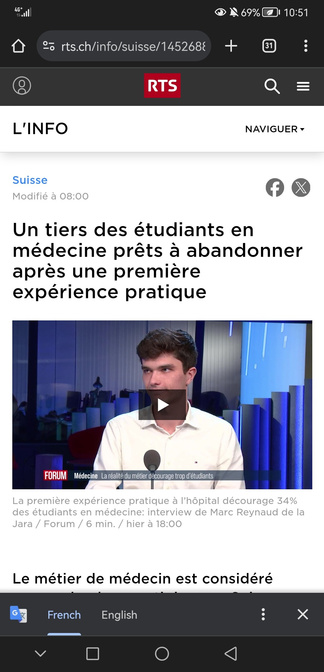
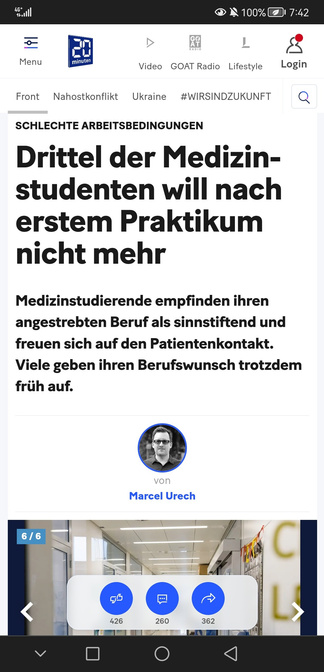
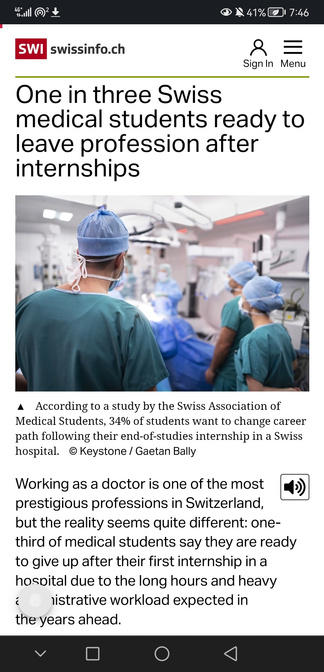
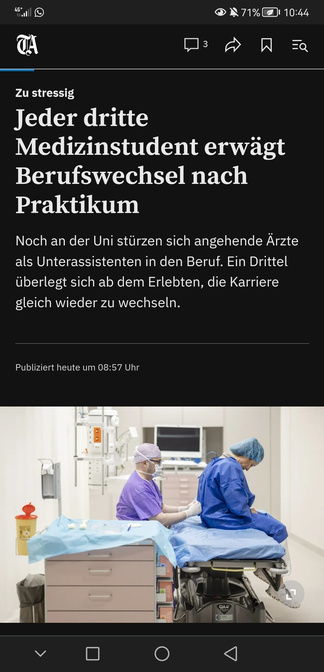
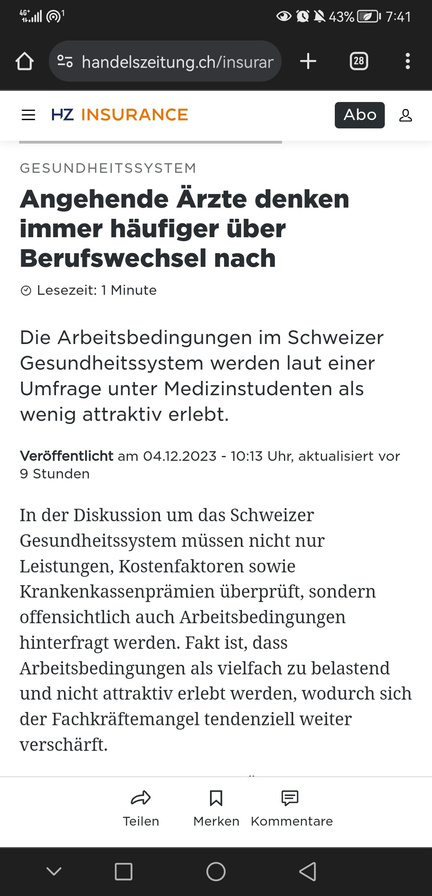
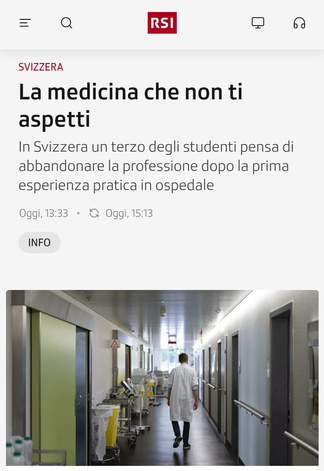
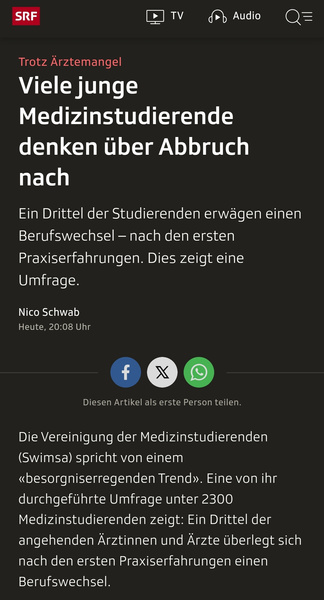
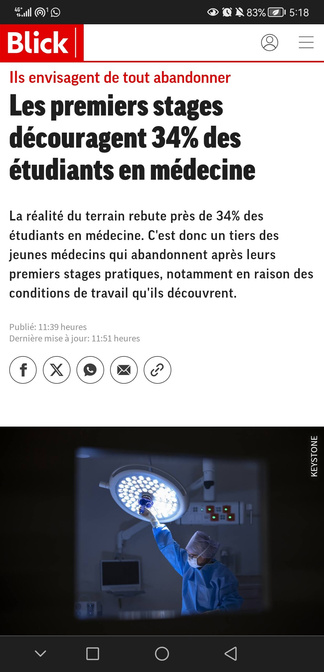
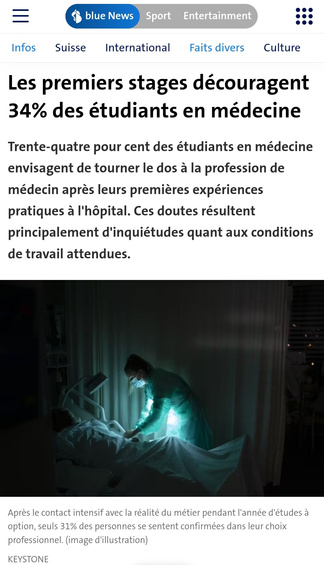
23
swimsa
Valeria Scheiwiller for SRF 10vor10
Marc Reynaud de la Jara for RTS Forum
24
swimsa

norpa weekend
Julia Zink, NORP
The NORPA Weekend co-hosted by the SCORA (Standing Committee on Sexual and Reproductive Health and Rights including HIV and AIDS) and SCORP (Standing Committee on Human Rights and Peace) was a 3-day long gathering for all NORAs, NORPs and other enthusiasts held in Bern, Switzerland.
25
swimsa
A Remarkable Weekend: swimsa hosted an international IFMSA event!
For the first time in years, swisma has taken the helm as a host for an IFMSA event—the NORPA Weekend. This extraordinary gathering was a sub-regional training, welcoming participants from across Europe, who are interested in advancing human rights, peace, and sexual and reproductive health.
Months of planning by the organizing committee, composed of all seven swimsa members, organised the weekend in a village near Walkringen (BE) from the 16th to the 18th of February. Our chalet had a breathtaking mountain view, and set the stage for sessions and vibrant discussions with around 50 participants.
The journey began on Friday when participants were warmly greeted at the Bern train station. An early arrival provided the opportunity for a private tour at the Bundeshaus, setting the tone for an engaging weekend. After heading to the accommodation and after the opening ceremony, the evening had a relaxed atmosphere
with a scavenger hunt, tote bag designing and a quiz about Switzerland where the participants got to know each other.
Saturday morning kicked off with a delightful breakfast of bierchermüesli and coffee, paving the way for insightful sessions. SCORA delved into topics such as abortion, inclusive healthcare, obstetric violence, HIV PrEP, and Chemsex. Simultaneously, SCORP tackled crucial themes, starting with the right to health, followed by discussions on ableism in the healthcare system, crisis management, humanitarian action, and the impact of social media on society.
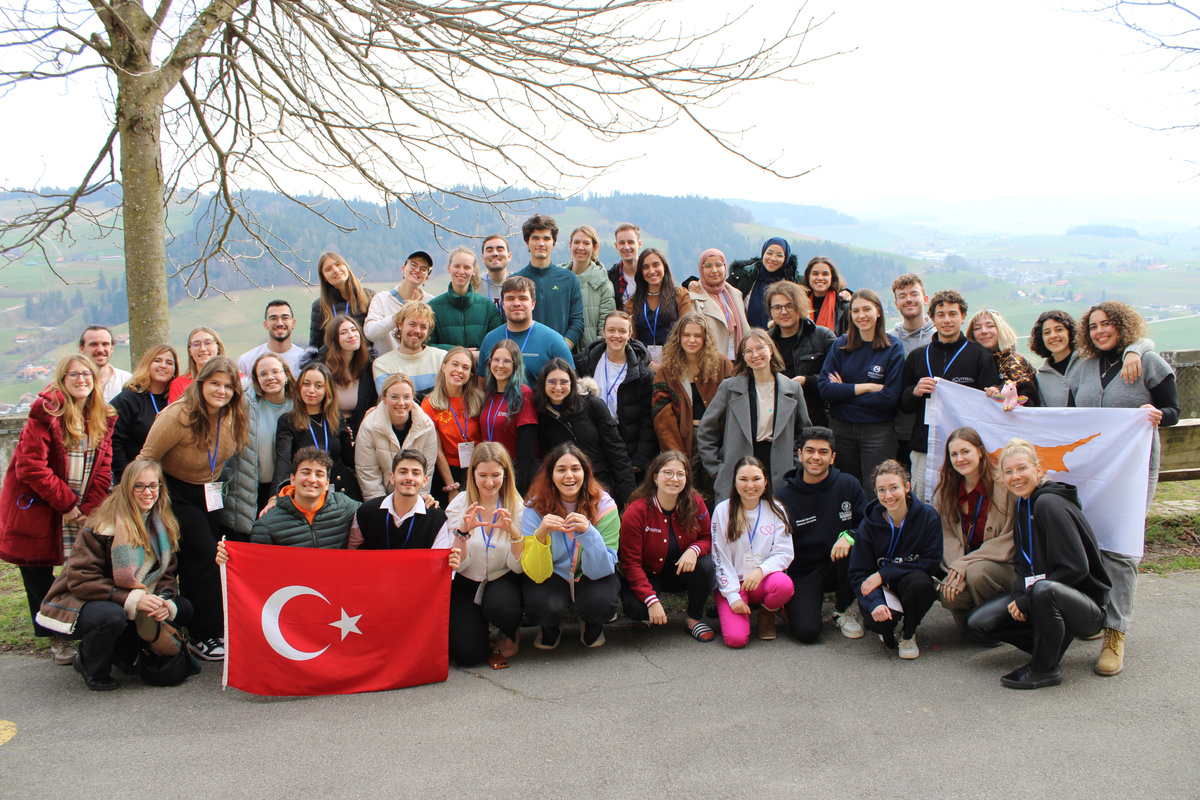
26
swimsa
A joint SCORA-SCORP session on gender-based violence fostered interactive group work and thought-provoking discussions.
To add a touch of Swiss exploration, participants ventured to Bern in the evening for a standing dinner and an amazing bachata class where everyone could show off their dancing skills.
Sunday morning- after coffee, the sessions covered AI, access to self-care, mental health, and BDSM in medicine.
The weekend ended with a joint session about refugees' access to healthcare, broadening persp-ectives and sparking insightful discussions.
After lunch, a closing ceremony was held before going to Bern's main train station where the weekend was brought to a close in a cafe.
The NORPA weekend was an amazing experience. New friendships were made, and international medical students with a shared passion for human and reproductive rights got to know each other. The enriching sessions sparked discussions that widened our horizons. For swimsa, the weekend strengthened our connection with IFMSA.
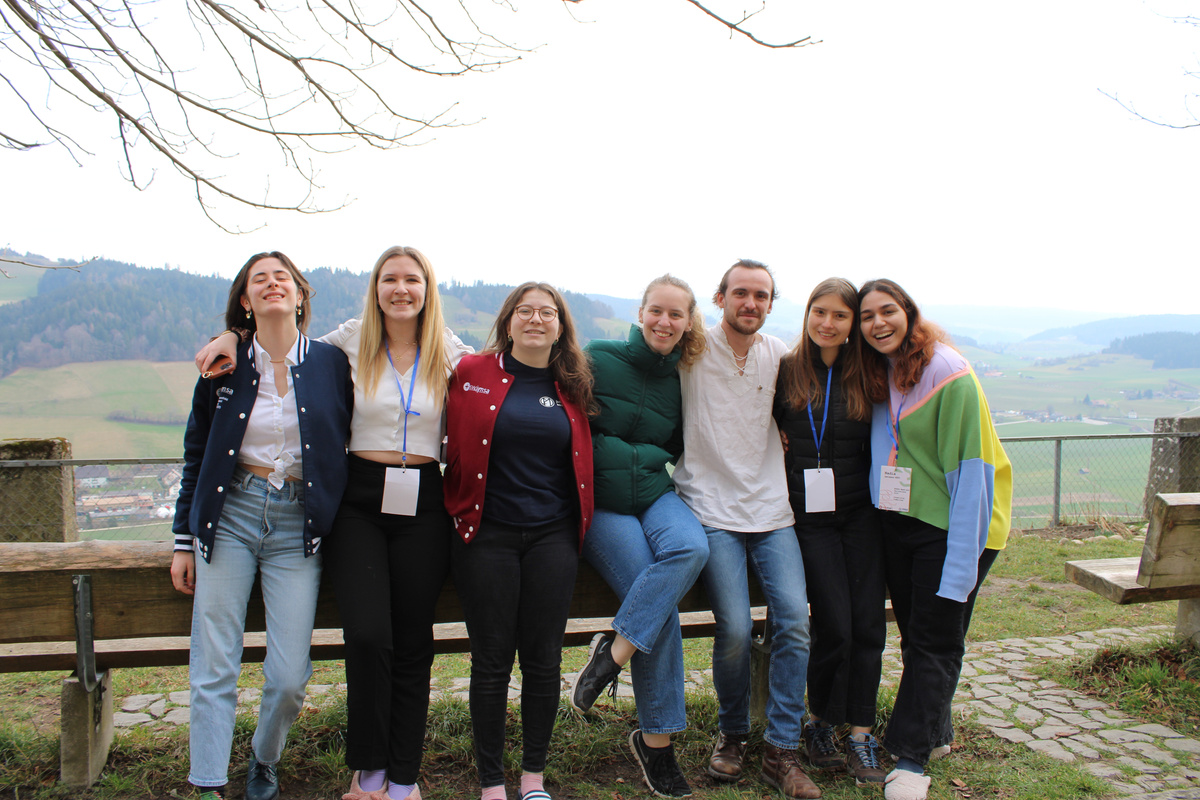
27
swimsa
jsems
student’s day 2023
Explore the highlights of last year’s JSEMS Student's Day in Interlaken, a snapshot of the enriching experiences and camaraderie that define this unique event.
A great start into the day
On 25th October 2023 medicine students from all over Switzerland met with the JSEMS team in Interlaken, in the canton of Bern. The congress took place in the ‘Kursaal Interlaken’ a beautiful location in the heart of Interlaken, itself, a city not to miss.
The congress started off with an introduction by the JSEMS president, Anne Cornevin. She was followed by PD Dr. med. Nina Kimmich who explained to us, how pregnancy influences women’s performance in sports. She highlighted the physiological adaptations and made recommendations for women participating in amateur, or professional sports. A great topic that the audience was clearly intrigued by.
At 10 o’clock we had a small coffee break which provided a great opportunity to connect with others.
Sandrine Siedler (ETH Zurich)
Sara Walder (UZH)
The next presentation was held by Dr. med. Paolo Colombani. He talked about sustainable nutrition and the importance of plant proteins. This topic sparked intense discussions. To loosen up, the presentation was followed by an active break, consisting of a small dance choreography. Everyone participated and we had a lot of fun.
Prof. Dr. med. Christian Schmied held the next presentation about sports cardiology, laying out some of the emerging evidence on there being a healthy upper limit in exercise. In the short break that followed, he was overwhelmed with questions that he was happy to answer.
28
swimsa
jsems
The last presentation before lunch was held by Dr. med. Nathalie Wenger who talked about ‘Fatigue in the adolescent athlete’. Her many case studies really captivated the crowd.
At 1pm delicious sandwiches were served for lunch. Once again, there was time to chat and socialize with both medical students or the lecturers. What a great opportunity!
An interesting afternoon
In the afternoon we had the chance to participate in different workshops. Each student could attend two out of four workshops. All workshops had different topics so that everyone’s interest could be satisfied.
In one workshop, Mr. Romain Frosio and Mrs. Jasmin Steiner showed us how taping could be used as a rehabilitation tool in physiotherapy, and we could directly try it out.
29
swimsa
Another workshop was about ‘The Psychology of Sports Performance’ which was held by Mr. Ray Popoola. He showed us how important psychology is even in amateur athletes by including examples of the crowd.
The third workshop was named ‘The happy doctor’. Dr. med. Corina Bello talked about how to succeed in the medical career while still looking after ourselves.
In the last workshop we learned how to examine the spine and how to perform an initial examination after a traumatic brain injury. This interesting workshop was held by Dr. med. Stefan Fröhlich.
Overall, the workshops were a great success, and they were an interesting change after the presentations in the morning.
jsems
Movement, dinner and drinks in the evening
As the sun dipped behind the Swiss Alps, the day in Interlaken took different turns for students. Some headed to the sports hall for more activities, while others began their journeys back to their hometowns. In Interlaken, though, the spirit of competition soared during an exhilarating badminton tournament. The winning team basked in the glory of victory, claiming a well-deserved prize, adding an extra layer of excitement to the evening.
Following the athletic pursuits, we gathered at the Jugendherberge of Interlaken for a delightful dinner. For some, this turned out to be the highlight of the day, as laughter echoed through the cozy venue,
and the lively atmosphere fostered engaging conversations with like-minded students from various corners of Switzerland.
The presence of young doctors added an enriching dimension to the evening, providing us with a unique opportunity to seek valuable advice and insights. The blend of camaraderie, delicious food, and shared experiences made this evening an unforgettable conclusion to a day brimming with insights gained from lectures and workshops on sports medicine, interspersed with moments of movement, friendly competition, and meaningful connections. Safe to say, we eagerly look forward to the next installation of the JSEMS Student’s Day, on the 14th of November in Bern, and are happy to welcome interested students to attend.
Stay up to date via our Instagram: @_jsems or via www.sems.ch/junior-sems
We are always happy to interact with interested students, just write us an email
Student’s Day: 14.Nov 2024, Wankdorf Bern
30
swimsa
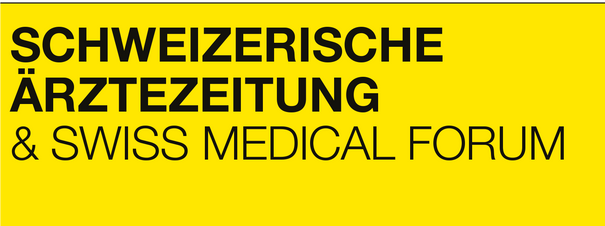
Es ist Zeit, das Leiden der Ärztinnen und Ärzte ernst zu nehmen. - Die Bedingungen für die Ausübung der ärztlichen Tätigkeiten haben sich in allen Bereichen verschlechtert. Bereits die Ärztinnen und Ärzte in Ausbildung stehen unter Druck, sodass ein Teil von ihnen überlegt, lieber auf eine klinische Tätigkeit zu verzichten. Ärztinnen und Ärzte nehmen es auf sich, der steigenden Nachfrage und den legitimen Bedürfnissen der Patientinnen und Patienten gerecht zu werden – sie wollen aber nicht wortlos weiterleiden.
Wie politische Entscheide Bürokratie ausbauen statt abbauen - Obwohl die Bürokratie im Gesundheitswesen als Problem gilt, wird sie weiter ausgebaut. Wenn die Verwaltung die Patientenversorgung gestaltet und die Politik die Expertise der Praxis ignoriert, wächst die Bürokratie und sinkt die Zeit für die Patientinnen und Patienten. Das schreckt auch viele angehende Ärztinnen und Ärzte ab.
Versorgungsimplosion statt Kostenexplosion - Beständig vermitteln Schlagzeilen den Eindruck, das Schweizer Gesundheitswesen weise schwere Systemfehler auf. Tatsächlich gehört es immer noch zu den erfolgreichsten der Welt. Die ständigen Warnungen vor einem Kostenkollaps ebnen jedoch den Weg zum Versorgungskollaps.
Die Schweizerische Ärztezeitung SÄZ ist die führende Zeitschrift der Schweizer Ärzteschaft und ihr standespolitisches Sprachrohr. Sie vereint gesundheits-politische und medizinische Themen.
Anmeldung: Mitglied werden | FMH
Bereits als Studentin oder Student der Medizin lohnt sich die Säz als Lektüre. Nach dem Bachelorabschluss können Medizinstudierende der FMH gebührenfrei beitreten: Diese Mitgliedschaft ist verbunden mit einem kostenlosen Abonnement der Weiterbildungszeitschrift Swiss Medical Forum und der Schweizerischen Ärztezeitung SÄZ.
31
swimsa
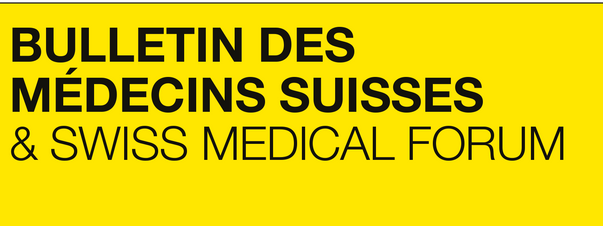
Les médecins souffrent, et il est urgent de les entendre! Dans tous les domaines d’activité, les conditions d’exercice de la médecine se sont dégradées. Les médecins sont déjà sous pression lors de leur formation, si bien qu’une partie d’entre eux préfèrent envisager de renoncer à une activité clinique. Les médecins, qui prennent sur eux pour répondre à l’augmentation de la demande et aux exigences légitimes des patients, ne veulent plus souffrir en silence.
Comment les décisions politiques augmentent la bureaucratie - La bureaucratie dans le secteur de la santé ne cesse d’augmenter bien qu’elle soit considérée comme un problème. Lorsque l’administration fédérale réglemente les soins aux patients et que les politiques ignorent l’expertise du terrain, c’est la bureaucratie qui augmente et le temps consacré aux patients qui diminue. Cela décourage aussi de nombreux futurs médecins.
Implosion de la prise en charge plutôt qu’explosion des coûts - Les gros titres des journaux donnent constamment l’impression que le système de santé de notre pays présente de graves défauts. En réalité, il fait toujours partie des plus performants au monde. Or, mettre sans cesse en garde contre une rupture engendrée par les coûts fait de facto le lit d’un effondrement de la prise en charge médicale.
Le Bulletin des médecins suisses (BMS) est la revue de référence du corps médical suisse et son organe de presse pour la politique professionnelle. Il aborde aussi bien des thèmes médicaux que de politique de la santé.
Inscriptions: Devenir membre | FMH
Le BMS offre déjà une lecture très intéressante aux étudiantes et étudiants en médecine, qui peuvent s’affilier gratuitement à la FMH après le bachelor et bénéficier entre autres d’un abonnement gratuit au Swiss Medical Forum et au Bulletin des médecins suisses.
32
swimsa
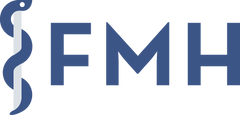
Mit der Kostenbremse droht Rationierung
Yvonne Gilli, Präsidentin FMH
Am 9. Juni 2024 wird die Schweiz eine wichtige Entscheidung über die Zukunft unserer Patientenversorgung treffen, die den Arztberuf nachhaltig prägen könnte. Neben der Prämien-Entlastungs-Initiative der SP kommt auch die Kostenbremse-Initiative der Mitte-Partei zur Abstimmung. Obwohl die zwei Initiativen recht ähnlich klingen und manchmal unter dem Begriff «Prämien-Initiativen» zusa-mmengefasst werden, unterscheiden sie sich ganz erheblich.
Die Prämien-Entlastungs-Initiative der SP richtet sich auf die Finanzierung der Gesundheitsversorgung. Sie fordert, dass niemand mehr als 10% seines verfügbaren Einkommens für die Krankenkassenprämien ausgeben soll und macht Finanzierungsvorgaben für Bund und Kantone. Zu dieser Initiative positioniert sich die FMH nicht. Wir stehen zwar klar für eine soziale Finanzierung des Gesundheitswesens ein, aber wie diese genau gestaltet wird, betrifft die Patientenversorgung nicht und wird unter Ärztinnen und Ärzten sicher auch unterschiedlich beurteilt.
Die Kostenbremse-Initiative der Mitte-Partei ist hingegen gefährlich, weil sie einen Kostendeckel für die Gesundheitsversorgung plant. Die Initiative nennt keinen einzigen Weg, wie sie Kosten dämpfen möchte – aber ein festes Ziel: Die Grund-versicherungskosten sollen zukünftig maximal 20% mehr als die Nominallöhne steigen dürfen. Damit hinge nicht mehr von den Bedürfnissen der Patienten sondern von der Wirtschaftsentwicklung ab, was die Grundversicherung bezahlt. Der Bundesrat warnte vor dieser star-ren Vorgabe, weil sie zu Rationierung führen kann – und auch alle Parteien ausser der Mitte sprachen sich dagegen aus.
Wo die Grundversicherung nicht alle notwendigen Leistungen bezahlt, entstehen Wartelisten und Zwei-klassenmedizin. Und wem die Aufgabe zur Rationierung zufallen wird, ist auch klar. Es wären die Ärztinnen und Ärzte, die Patientinnen und Patienten auf die Wartelisten setzen müssten. Dagegen wehren wir uns mit vielen Partnern im Gesundheitswesen.
Unter https://nein-zur-kostenbremse.ch/ können Sie sich informieren und uns unterstützen.
33
swimsa

Le risque de rationnement du frein aux coûts
Yvonne Gilli, présidente de la FMH
A l’inverse, l’initiative pour un frein aux coûts du parti du Centre est dangereuse, car elle prévoit de plafonner les coûts des soins de santé. Elle ne mentionne à aucun moment comment réduire les coûts - mais pose un objectif fixe : à l’avenir, les coûts de l’assurance obligatoire ne devront pas augmenter de plus de 20 % par rapport aux salaires nominaux. Ce ne seraient donc plus les besoins des patientes et patients mais l’évolution économique qui déterminerait ce que l’assurance obligatoire rembourserait. Le Conseil fédéral a mis en garde contre la rigidité de ce projet, qui risque de conduire à un rationnement des prestations - et tous les partis, à l’exception du Centre, se sont fermement prononcés contre l’initiative.
Une assurance obligatoire qui ne rembourse pas toutes les prestations, c’est la porte ouverte à des listes d’attente et à une médecine à deux vitesses. On entrevoit aussi déjà à qui incombera la tâche de procéder au rationnement. Les médecins devraient inscrire les patientes et les patients sur les listes d’attente. C’est ce à quoi nous nous opposons avec de nombreux partenaires de la santé.
La décision que prendra la Suisse lors de la votation du 9 juin 2024 sera importante pour l’avenir de la prise en charge des patientes et des patients et pourrait marquer durablement la profession de médecin. Deux initia-tives seront soumises au vote : l’allège-ment des primes du PS et un frein aux coûts du parti du Centre. Même si ces deux initiatives peuvent paraître assez similaires et qu’elles sont parfois regroupées sous le terme d’« initiatives sur les primes », elles sont très différentes.
L’initiative d’allègement des primes du PS vise le financement des soins de santé. Elle demande que personne ne dépense plus de 10 % de son revenu disponible pour les primes d’assurance-maladie et fixe des objectifs de financement pour la Confédération et les cantons. La FMH n’émet pas d’avis pour cette initiative. Nous sommes clairement favorables à un financement social du système de santé, mais la manière dont celui-ci est organisé n’impacte pas les soins aux patients et les médecins partagent certainement des avis très différents.
Vous pouvez vous informer et nous soutenir sur le site https://frein-aux-couts-non.ch/.
34
swimsa
yssa: young surgical students association
students empowering students
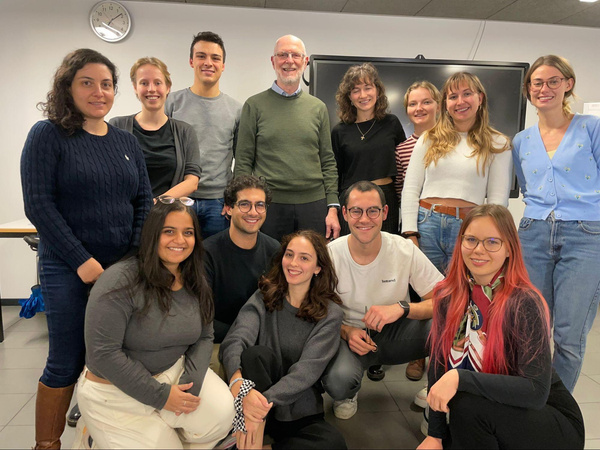
YSSA Switzerland was founded in September 2023 by six Swiss universities including Université de Lausanne, Università della Svizzera italiana, Universität Zurich, Universität Basel, Université de Fribourg, and Université de Genève. We are a student association whose core purpose is to initiate the training of tomorrow's surgeons as early as possible in their medical education.
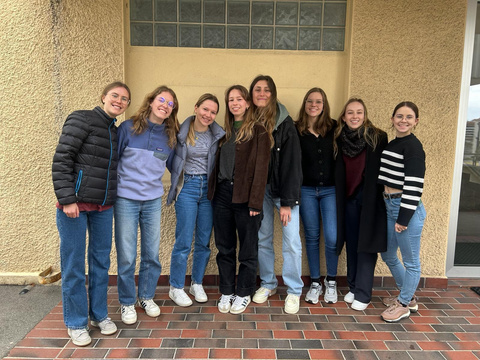
YSSA Ticino
to meet the strong demand for more practical skills courses, with the goal of exposing medical students to suturing early in their medical school experience.
YSSA Switzerland offers suturing courses open to medical students with or without prior suturing experience. Our workshops are given independently for students from various years of medical studies wishing to learn or hone their skills in wound suturing. Each workshop is led by suturing tutors and a training supervisor.
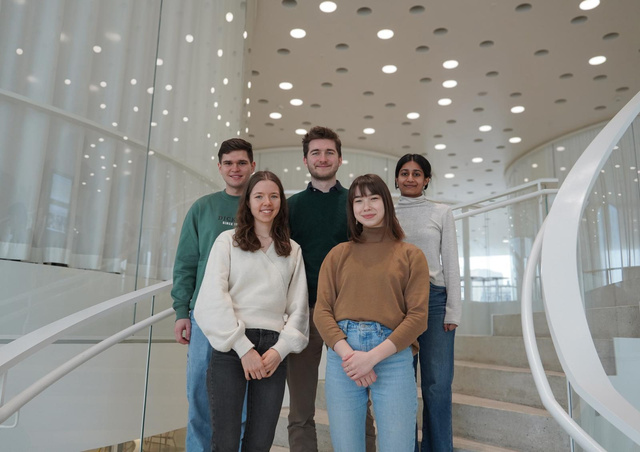
YSSA Fribourg
Indeed, whilst we have observed an immense interest in surgical suture among medical students, there remains a lack of opportunities for students to practice their suturing skills in a low-stress environment prior to starting their clinical clerkships. As part of our mission, we are committed
YSSA Basel
35
swimsa
yssa: young surgical students association
Our tutors are medical students who were trained by Professors and surgeons from different universities. Some universities have also recorded e-learning videos. Moreover, they benefit from regular assessments of their suturing skills, as well as additional practical courses given by several surgeons of each university.
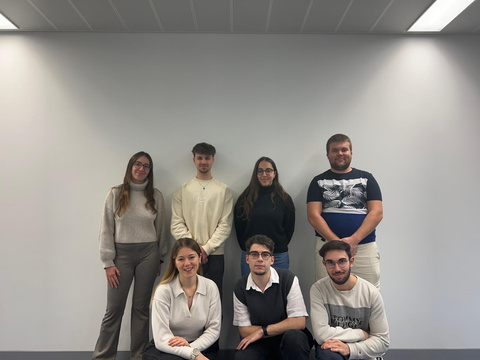
YSSA Geneva
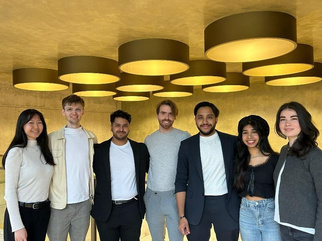
YSSA Zürich
Our training is based on the EPA 5 PROFILES objectives. As of this date, we offer students courses that cover a few suture techniques such as simple interrupted suture, Donati suture, simple continuous suture and intradermal suture. We also plan to organise trainings in local anaesthesia administration, operating room protocols and infection control, as well as introductory courses to laparoscopic techniques.
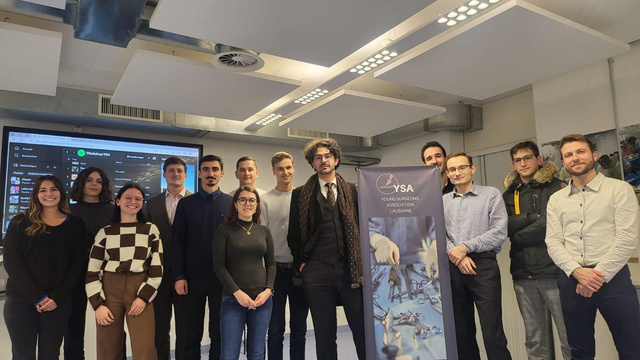
YSSA Lausanne
36
swimsa
medstache, lausanne
Go big or go home. That’s a good piece of advice. Except when talking about testicular cancer. Great… Now that I have your attention, let’s talk about some interesting stuff concerning our Gents out there.
Dear lads, stay assured, size doesn’t matter… Except for one thing: Your family jewels. You certainly don’t want one of them growing out of control! Thereby, to avoid an unfortunate situation, check yourself! Yes, I am talking to you, my lovely Hombres with Cojones. Listen to me carefully :
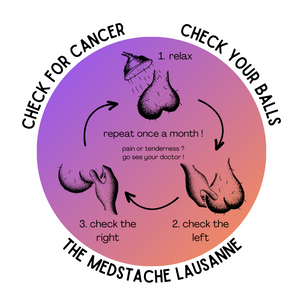
men’s health, let’s talk
about it!
Dinis da Costa (UNIL)
About once a month, after a warm and relaxing shower, take one testicle between your thumb and index finger, and examine it by rolling it all over its surface. Repeat the operation on your second gonad and compare it with its brother.
If your joyful chaps feel painless and their surface is smooth, if they don’t feel asymmetrical in size and your fingers don’t find any abnormal bump or growth, then you’re all good! Otherwise, stay calm. This doesn’t necessarily mean that you have cancer, it could be completely benign. But better be safe than sorry, so contact a doctor as soon as possible so you can explain your findings and get your testes professionally examined.
37
swimsa
medstache, lausanne
I hope you enjoyed our little awareness campaign. We are The Medstache Lausanne. It’s a pleasure to meet you. If you paid attention, you might have already guessed what we do. We are a medical students association from the University of Lausanne, and we raise awareness on men’s health by organizing events, conferences and workshops throughout the year. Although we chose to develop more on testicular cancer on this article, our range of work covers much more, including prostate cancer and men’s mental health (ever heard of Movember?).
Testicular cancer predominantly touches the younger male population, between the ages of 15 and 40. This is why we, young students, choose to focus on this aspect of men’s health the most. The “good” thing about testicular cancer is that you can check yourself easily in the comfort of your own shower, and if caught early, this type of cancer has a high recovery rate.
Until now, we have managed to reach some organizations and institutions outside of the Faculty of Medicine of Lausanne. But we’re looking to reach more people, more universities and therefore we need your help! If you, or somebody you know, are interested in working with us, we would be more than happy to get in touch with you!
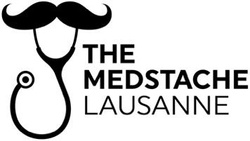
That’s why we need you, fellow medstudents, to spread the word about this cancer and how to check for it. Testicular health remains a very taboo subject in our society. But raising awareness will help numerous young men seek medical advice earlier, and it may save their lives.
Contact us at: medstache@swimsa.ch
38
swimsa
fawe, metis
fawe, metis
Diane Grognuz
Access to healthcare for all. This is the mission of M.E.T.I.S - Mouvement des Étudiant-e-s Travaillant contre les Inégalités d'accès à la Santé - an association based at the University of Lausanne. One of these projects, called FAWE (Food And Water for Everyone), was launched in 2021 in partnership with the Africa Smile association based in Lomé, Togo. The main aim of this project is to provide assistance to certain Togolese villages to facilitate their access to healthcare.
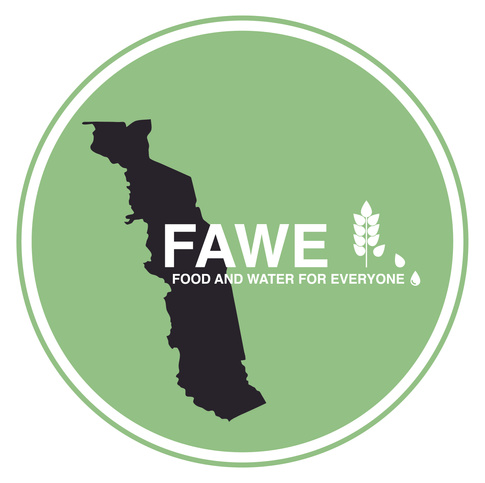
39
swimsa
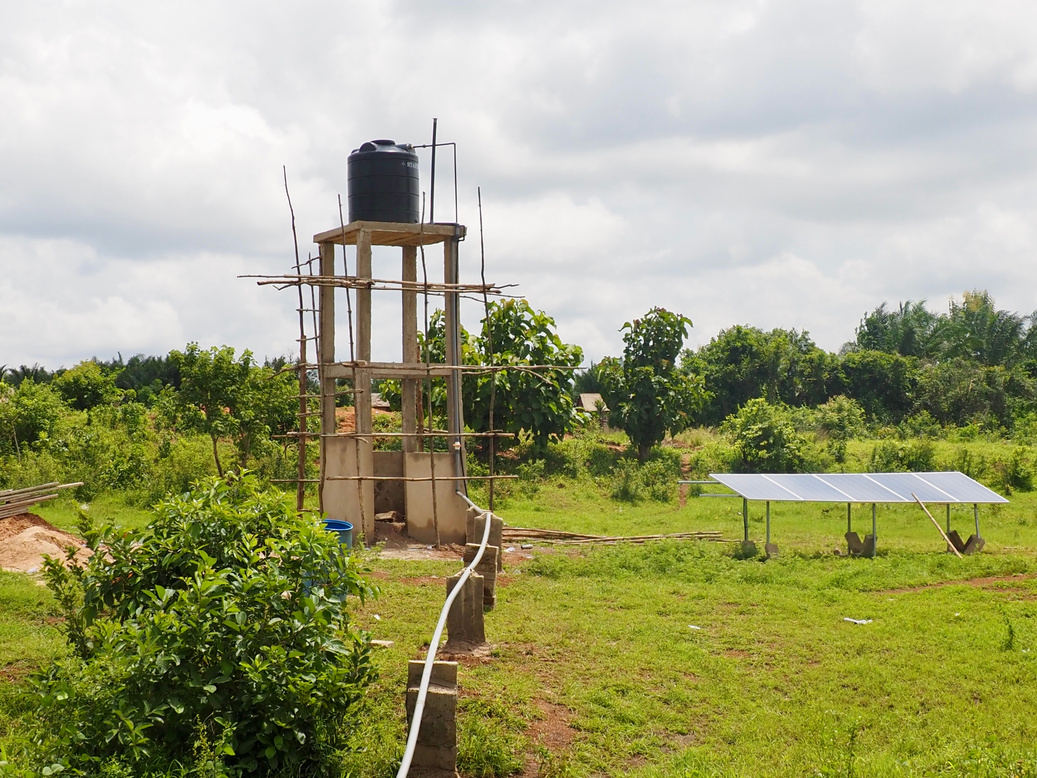
In 2023, through the support of swimsa, the project was able to finance a borehole and a mill in Yoto Kopé, a small village north of Lomé. This borehole provides access to drinking water for over 6,000 inhabitants.
On the other hand, the mill produces corn and soy flour, which is packaged and distributed to malnourished children in villages further north in Togo, where famine is particularly prevalent.
fawe, metis
The flour is also distributed to the elementary school founded by Africa Smile for out-of-school children. Till date, we have been able to finance the production of 1,200 kg of nutrient-enriched flour.
Screening of malnourished children is carried out in collaboration with the medical team led by Dr. Tchalla, who has a long-standing relationship with Africa Smile.
After all these achievements, in 2024 the project wanted to make a concrete contribution for the healthcare. That's why we decided to support the construction of a health center in the village where the borehole was built.
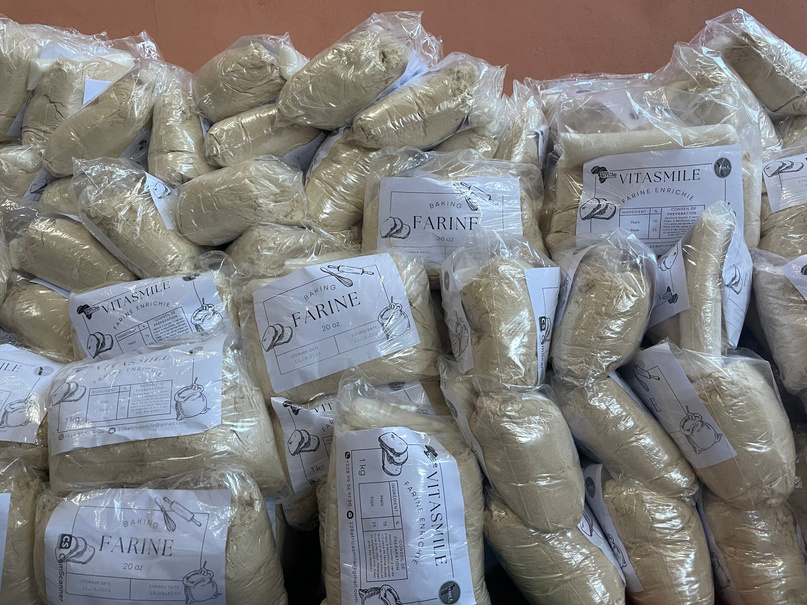
During our trip to the area in the summer of 2023, we came to the edifying conclusion that many deaths could be avoided if the population had faster access to a hospital. It was therefore decided to finance a hospital that would include a maternity ward, a prevention ward, a pharmacy and vaccination ward, and finally an internal medicine ward.
To achieve this goal, the FAWE project team works throughout the year to raise the funds needed to build the health center. Now, having strengthened our relationship with Africa Smile, our commitment continues to make ongoing improvements in these crucial areas to promote access to healthcare for more people.
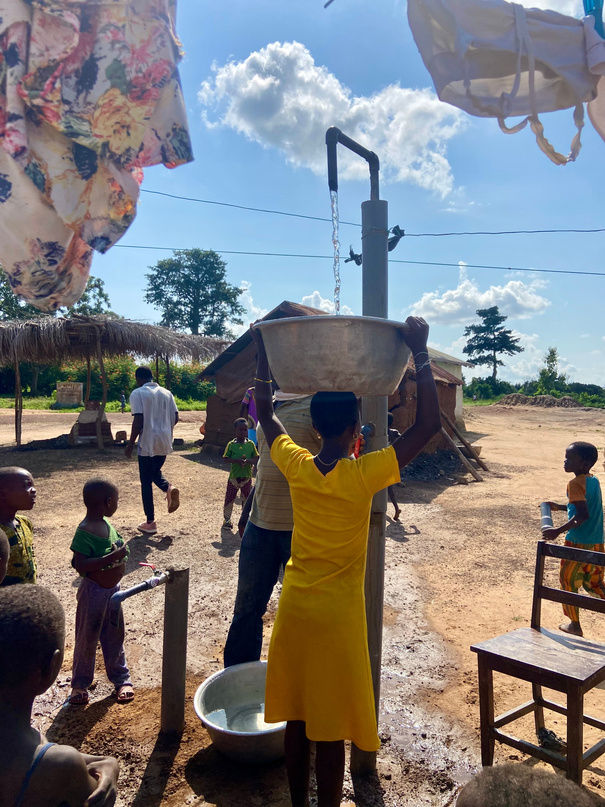
40
swimsa

vsao-Webinare für Studierende begeistern
Seit bald einem Jahr organisiert der Verband Schweizerischer Assistenz- und Oberärztinnen und -ärzte (vsao) Webinare, welche sich vor allem an Medizinstudierende richten. Um die Teilnahme möglichst vielen Personen zu ermöglichen, sind diese kostenlos und werden auf Englisch durchgeführt. An den Webinaren werden Themen behandelt, die im Medizinstudium keinen Platz finden: Wie fühlt sich eigentlich ein Nachtdienst an? Wie findet man nach einer Woche Nachtschicht wieder zurück in einen «normalen» Schlafrhythmus? Wie kommuniziert man mit Patient:innen und Arbeitskolleg:innen, insbesondere wenn es um schwierige Themen geht und man sich bei einer Entscheidung unsicher ist?
Die ersten beiden Webinare waren ein voller Erfolg und gut besucht. Bei der ersten Ausgabe erzählten zwei praktizierende Assistenzärzt:innen, wie es ist, in der Nacht zu arbeiten und wie sie sich darauf vorbereitet haben. Bei der ersten Nachtschicht ist es wichtig, sich daran zu erinnern, dass man nicht alleine ist und man bei Bedarf auch bei Kolleg:innen oder Vorgesetzten nachfragen kann. Auch die Pflegenden können mit ihrer Erfahrung und ihrem Wissen bei Unsicherheiten unterstützen. Im zweiten Webinar ging es um Kommunikation, insbesondere mit anderen Mitarbeitenden des Spitals aber auch mit Patient:innen – wie frage ich sie, ob sie im Fall der Fälle reanimiert werden möchten oder nicht? Die Aufzeichnungen der Webinare sind auf der vsao-Website verfügbar.
Das nächste Webinar findet am Dienstag, 9. April statt und widmet sich dem Thema des Zeit- und Selbstmanagements. Dabei wird gezeigt, wie man die knappe Ressource «Zeit» gut nutzt, Prioritäten setzt und dabei auch sicherstellt, dass man noch Freude am Beruf hat.

41
swimsa

Les webinaires de
l’asmac suscitent l’enthousiasme
L’Association suisse des médecins-assistant(e)s et chef(fe)s de clinique (asmac) organise depuis bientôt un an des webinaires destinés en premier lieu aux étudiants en médecine. Pour permettre au plus grand nombre d’y participer, ils sont gratuits et se déroulent en anglais. Les webinaires abordent des sujets qui ne trouvent pas de place dans les études de médecine: Qu’est-ce que ça fait de travailler la nuit? Comment parvient-on à retrouver un rythme du sommeil normal après une semaine de services de nuit? Comment communique-t-on avec les patients et les collègues, en particulier lorsqu’il s’agit de thèmes difficiles et que l’on n’est pas sûr de la décision à prendre?
Les deux premiers webinaires ont rencontré un franc succès et accueilli de nombreux participants. Lors de la première édition, deux médecins-assistant(e)s ont parlé de leurs expériences du travail de nuit et de la manière de s’y préparer. Lors de son premier service de nuit, il est important de ne pas oublier que l’on n’est pas seul et que l’on peut demander conseil à des collègues ou à son supérieur ou s’adresser au personnel soignant qui peut, grâce à son expérience et à ses connaissances, également apporter une aide en cas de doute. Le deuxième webinaire a abordé la communication, en particulier avec les autres collaborateurs de l’hôpital, mais aussi avec les patients: comment leur demander s’ils souhaitent, le cas échéant, être réanimés ou pas? Les enregistrements des webinaires sont disponibles sur le site web de l’asmac.
Le prochain webinaire se déroulera le 9 avril et sera consacré au thème de la gestion du temps et de soi-même. Il montrera comment bien utiliser la précieuse ressource qu’est le temps et fixer les bonnes priorités tout en conservant le plaisir d’exercer son métier.
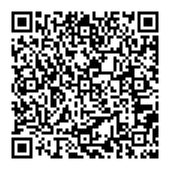
42
swimsa
scope exchanges
prague
czech republic
Jakub Novotny
My exchange took place in Prague, Czech Republic. I got a leftover spot after participating in the NGA of IFMSA-CZ and talking to my good friend Jenny who was part of the National Exchanges team of swimsa and also took part in the NGA. As the president and NEO-In of the Czech NMO became good friends of mine they kind of helped me with deciding about the department and LC I stayed in. I am very fond of intensive care and emergency care and would love to do it in the future and in the Czech Republic this is mostly handled by the “ARO” which is the department of Anaesthesiology and resuscitation. My preparations otherwise were very basic, as my parents are both from Prague meaning that I have some family there and speak the native language quite well.
So as per suggestion from my CP and other friends from the Czech Republic I was in the Anaesthesiology and Resuscitation department in the university hospital of the 3rd Faculty of Medicine - Charles University in Prague.
I loved every second of it. Most of the days I was in an OR with an Anaesthesiologist learning all there is about it and trying to intubate patients myself. Although one of my most important daily activities was to explain to the doctors why I could speak Czech. One of the days I was in the burn unit of the hospital which is the biggest out of the 3 that exist in the Czech Republic. Unfortunately or fortunately (for the patients) I did not see any new admissions on that day.
In Prague I commuted every day by bus. From door to door it took me about 45 min which is actually less than I had in other internships in Switzerland. My CP helped me with getting a ticket for the entire month in Prague, so I did not have to think about anything while getting on the various busses and metro.
43
swimsa
The LC and my CP did a great job in helping me with various things and organizing social events for all the incomings. I knew beforehand that September might not have the biggest social program as the prime months for an exchange are in July and August but still the various activities that were planned were really enjoyable.
I was able to attend an IFMSA CZ internal weekend, where we rented a chalet and mostly did not do any work related things. Also there we celebrated my CPs or in other words the IFMSA CZ President’s birthday. There I tried many traditional beverages such as various beers and Slivovice. All in all it was a weekend to remember. On a different one I visited the zoo which for me is one of the best things you can do for a date. So for everyone reading this, you’re
welcome.
In Prague I stayed in a dorm from the Charles University which was on the outskirts of Prague. The accommodation was kept very clean and I received all the cooking utensils I ever needed from my CP.
It was a nice gesture but to be perfectly honest I filled my belly with
all the great bread options that are
only available in the Czech Republic.
All the other incomings were also in this dorm which made it easy to meet up and go explore Prague together in the afternoons or evenings.
During my stay, there were many discussion going on about changes in the healthcare system and on how overtime will be paid in the future. Every doctor I ran into during my internship had a lot to say about it, as it really changes from how it was done until now and this not for the better. Our Healthcare systems do differ to a certain degree but are also same in the regard that everyone is insured and has some form of health insurance. But I learned, that patients in 99% of the cases did not have to pay extra fees, unlike here in Switzerland, when the
ambulances are being called for almost everything.
One month was definitely not enough time to explore everything that Prague has to offer. But it gave me a good inside scope of how the healthcare system in the Czech Republic functions. And it helped me questions our system more and whether everything we do is sustainable for the next decades to come.
44
swimsa
Unsere Angebote – Ihre Vorteile
Falls Sie bereits eine Versicherung bei einer der genannten Versicherungen besitzen, dann prüfen Sie einen Übertritt in unsere Kollektiv- verträge. Wir unterstützen Sie gerne dabei.
Allianz Suisse
– Motorfahrzeugversicherung
– Hausrat- und Privathaftpflichtversicherung
– Berufs- und Betriebshaftpflichtversicherung – Geschäftsversicherung
– Gebäudeversicherung
– Technische Versicherung
– Krankentaggeldversicherung
– Unfallversicherung UVG
– UVG-Zusatzversicherung
– Cyberschutz
– Reiseversicherung
– Wertsachen
AXA-ARAG
– Rechtsschutzversicherung
(Privat-, Verkehrs- und Berufsrechtsschutz)
Helvetia
– Motorfahrzeugversicherung
– Hausrat- und Privathaftpflichtversicherung
– Berufs- und Betriebshaftpflichtversicherung – Geschäftsversicherung
– Gebäudeversicherung
– Technische Versicherung
– Krankentaggeldversicherung
– Cyberschutz
– Reiseversicherung
– Wertsachen
Innova
– Krankentaggeldversicherung
Schweizerische Ärzte-Krankenkasse
– Krankentaggeldversicherung / Invaliditäts-Taggeld
Versicherung der Schweizer Ärzte Genossenschaft – Lebensversicherung
Visana
– Unfallversicherung UVG
– UVG-Zusatzversicherung
– Krankentaggeldversicherung
Zürich Versicherungs-Gesellschaft AG
– Motorfahrzeugversicherung
– Hausrat- und Privathaftpflichtversicherung
– Gebäudeversicherung
– Reiseversicherung
– Krankentaggeldversicherung
Concordia / ÖKK / SWICA / Visana
– Krankenzusatzversicherungen
Exklusive Lösungen für mediservice vsao-asmac-Mitglieder 031 350 44 22 – wir sind für Sie da.
info@mediservice-vsao.ch, www.mediservice-vsao.ch
Nos offres – vos avantages
Si vous avez déjà conclu une assurance auprès d’une des compagnies mentionnées, examinez un passage dans nos contrats collectifs. Nous vous assistons volontiers.
Allianz Suisse
– Assurance de véhicules à moteur
– Assurance-ménage / Assurance responsabilité
civile privée
– Assurances RC entreprise et professionnelle
– Assurance d‘entreprise
– Assurance bâtiments
– Assurance technique
– Assurance-maladie d’indemnités journalières
– Assurance-accidents selon la LAA
– Assurance complémentaire LAA
– Cyber
– Voyage / Assistance
– Objets de valeur
AXA-ARAG
– Assurance de protection juridique
(protection juridique professionnelle, privée et en
matière de circulation)
Helvetia
– Assurance de véhicules à moteur
– Assurance-ménage / Assurance responsabilité
civile privée
– Assurances RC entreprise et professionnelle
– Assurance d‘entreprise
– Assurance bâtiments
– Assurance technique
– Assurance-maladie d’indemnités journalières
– Cyber
– Voyage / Assistance
– Objets de valeur
Innova
– Assurance-maladie d’indemnités journalières
Caisse-Maladie des Médecins Suisses
– Assurance-maladie d’indemnités journalières /
L‘indemnité journalière d‘invalidité
Assurance des Médecins Suisse société coopérative – Assurance-vie
Visana
– Assurance-accidents selon la LAA
– Assurance complémentaire LAA
– Assurance-maladie d’indemnités journalières
Zurich Compagnie d‘Assurances SA
– Assurance de véhicules à moteur
– Assurance-ménage / Assurance responsabilité
civile privée
– Assurance bâtiments
– Assurance voyages
– Assurance-maladie d’indemnités journalières
Concordia / ÖKK / SWICA / Visana
– Assurance maladie complémentaire
Solutions exclusives pour les membres mediservice vsao-asmac 031 350 44 22 – nous sommes là pour vous. info@mediservice-asmac.ch, www.mediservice-asmac.ch
scope exchanges
taichung
taiwan
My chosen department for the internship was the emergency department. This choice allowed me to immerse myself in a medical specialty I'm passionate about and navigate my way through the daily tasks without extensive patient communication, given my limited proficiency in Chinese. Upon arriving in Taichung, one of my contact persons warmly welcomed me, introduced me to the university campus, and settled me into my acco-mmodation, a clean and comfortable student dormitory. The dormitory featured shared living spaces with an Austrian flatmate studying dentistry, fostering a diverse and enriching living environment.
The dedication and active involve-ment of my contact persons in Taiwan left a lasting impression on me. They organized outings to night markets and even planned a weekend trip to Sun-Moon Lake, making my stay un-forgettable. For future exchange students considering Taiwan, I stron-gly recommend exploring the west coast, which boasts stunning natural beauty in places like Hualien and Taitung.
Samuel Donovan
My SCOPE Exchange in Taiwan was truly a life-changing experience, offering me unique insights into the Taiwanese healthcare system, culture, and medicine. I had the privilege of
interning at Zhong Shan Medical University in Taichung, the second largest city in Taiwan, which provided a remarkable opportunity to broaden my horizons.
Before embarking on this journey, I had the chance to connect with my Local Exchange Officers (LEO) from Taiwan. Their guidance helped me prepare for the internship, ensuring that I was well-equipped for my time in the hospital. I also took the initiative to bring along some Swiss chocolates as tokens of appreciation for the contact persons and doctors I would be working with.
47
swimsa
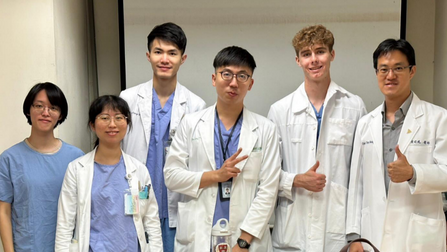
During my internship, I discovered that Taiwan's healthcare system significantly differs from Switzer-land's. Taiwan's comprehensive health insurance provides access to healthcare for all, but the medical professionals I worked with faced an exceptionally demanding workload. In the emergency department, they worked long hours, often exceeding 12-13 hours per day, with just a short 20-minute break for meals.
I was particularly fascinated by the integration of traditional Chinese medicine with Western medicine in Taiwan. Many doctors had expertise in both disciplines, and I witnessed how this dual approach benefitted certain patients.
While the medical education system in Taiwan follows a similar six-year curriculum as Switzerland, they have two additional postgraduate years before entering a residency program, a distinction not found in Switzerland.
48
swimsa
Despite the language barrier, which proved to be my primary challenge, the medical team's proficiency in English allowed me to follow the proceedings and maintain an observational role during my clerkship. While I didn’t engage a lot directly with patients, the doctors' effective communication and detailed English notes on patient records enabled me to gain valuable insights.
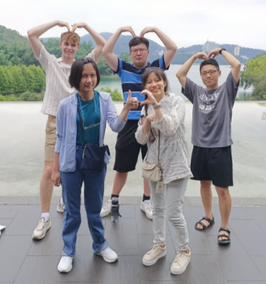
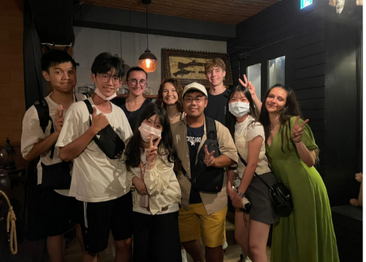
In conclusion, my SCOPE Exchange in Taiwan underscored the paramount importance of communication in a clinical setting, emphasizing how language barriers can significantly im-pact patient care. My experience solidified the truth of the saying: "A SCOPE Exchange is not a month in your life but a lifelong experience in a month." I am immensely grateful for this transformative experience and the lasting connections I made during my time in Taiwan.
Interested in going on an exchange with swimsa to countries like Czech Republic, Taiwan and many more?
Keep an eye out on our social media - instagram, LinkedIn, our website at www-swimsa.ch or contact vpx@swimsa.ch for more information!
49
swimsa
Cophr
Inequities are widespread, and often their root causes are complex and interconnected. This complexity also extends to the healthcare system. In order to explore these issues more deeply and address them, swimsa has established the Commission on Public Health and Human Rights and Peace (CoPHR). This functions as a platform for students who have an interest in subjects related to Public Health and Human Rights, encouraging their involvement in these matters, regardless of their current level of expertise.
The main goal of the commission is to provide students with the opportunity to exchange ideas on the topic, discuss ideas, and develop projects from them. These projects are then implemented in smaller working groups to enable active engagement for all participants.
Within the framework of CoPHR, events related to the focus topics are
organized, social media campaigns are planned and executed, and position papers are written.
You may know us from the Instagram campaign on the swimsa account on mental health- we are the ones who created the posts!
This semester, we will run a charity project, create Instagram campaigns and focus on mental health. We will also hold two workshops at the SMSC where you can meet us!
Every motivated person is welcome, and no previous experience is required. We are looking forward to hearing your ideas, since your voice will actively give life to this project.
If you want to know more about the Commission, join one of our meetings or want to tell us something, contact us at norp@swimsa.ch or npo@swimsa.ch. We are looking forward to meeting you!
50
swimsa
how to get involved
51
swimsa
Wondering how to stay in the loop about upcoming opportunities?
swimsa consistently shares its latest openings and enticing engagement options across multiple platforms. You'll find us actively posting on Instagram, as well as spreading the word through our newsletters and on Facebook. To ensure you don't miss out, ensure you follow us and feel free to contact us if you have any questions!
meet us in person at the upcoming smsc!
An excellent way to kickstart your involvement is by attending the SMSC - Swiss Medical Students’ Convention, held biannually. Detailed instructions on how to register for the next SMSC will be accessible through swimsa's social media channels and your local student council.
build your skills beyond medical theory with capacity building!
While 'Capacity Building' may sound sophisticated, it essentially boils down to sharing knowledge, particularly in our context, focusing on soft skills like public speaking, non-violent communication, or leadership. Swimsa hosts these events to equip you with valuable skills that extend beyond what medical school typically provides, ensuring you're better prepared for the future.
Contact the NOCB for further information.
52
swimsa
swimsa goes international, and so can you!
swimsa is a proud member of the International Federation of Medical Students' Associations (IFMSA), a global network. IFMSA organizes several events annually, usually in March, April, and August. If you aspire to join these events, there's a formal application process, and your odds of securing a spot greatly improve if you've already been involved with swimsa.
For additional information, feel free to subscribe to our newsletter or get in touch with our Vice-President for Global Affairs at vpg@swimsa.ch.
Are you enthusiastic about promoting sexual health and rights?
Whether you're already well-informed or eager to learn more about reproductive health, or STIs, the Commission on Sexual Health (COSH) is the ideal starting point.
You can reach out to our NORA at nora@swimsa.ch.
swimsa exchanges with the world!
swimsa plays a pivotal role in facilitating your international exchange experience. We offer two types of exchanges: a professional (clinical) exchange within a hospital setting and a research exchange in a research facility. To learn more about how to embark on an exchange, visit our website or check our social media platforms. We update the dates and send reminders as the deadlines approach. Make sure you’re following us on social media and keep an eye out in the newsletters for more information!
Moreover, you can actively contribute to the exchange program by getting involved at the local or national level. We're constantly on the lookout for motivated individuals who can ensure that students coming to Switzerland for an exchange have all the support they require. If you're interested in meeting people from around the world and want a smooth introduction to swimsa, don't hesitate to reach out to our Vice-President for Exchanges at vpx@swimsa.ch.
53
swimsa
AK/cofo
Our Medical Education Commission is committed to amplifying the voices of medical students in Switzerland. We work tirelessly to maintain the high standards of medical education and make improvements when needed. If you'd like to learn more or participate in one of our meetings, please feel free to reach out to us at vpa@swimsa.ch.
CoPHR - Commission on Public Health and Human Rights
This commission covers a broad spectrum of topics, including Mental Health and Planetary Health. If you're passionate about making a contribution, don't hesitate to get in touch with our National Officers for Public Health (npo@swimsa.ch) and Human Rights and Peace (norp@swimsa.ch) to learn more.
swimsa positions
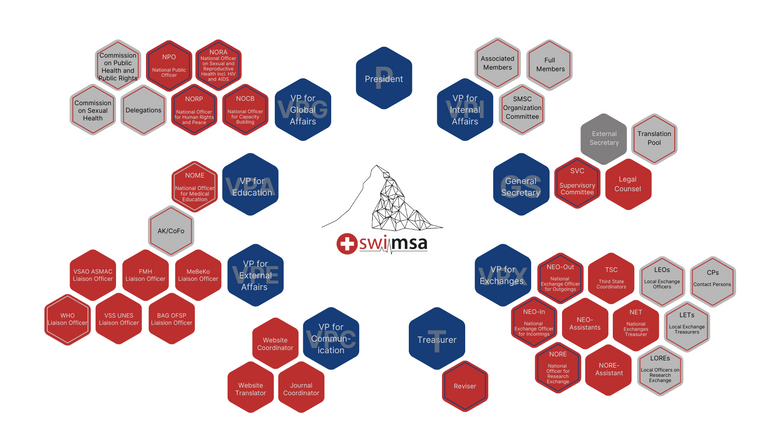
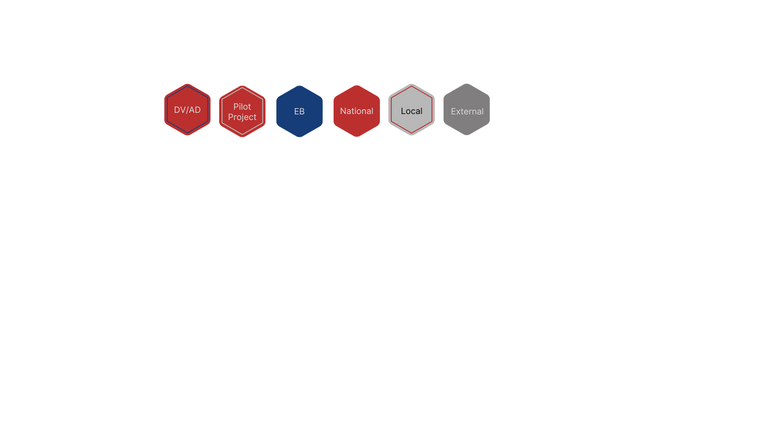
54
swimsa
where to turn to?
meet your local student association
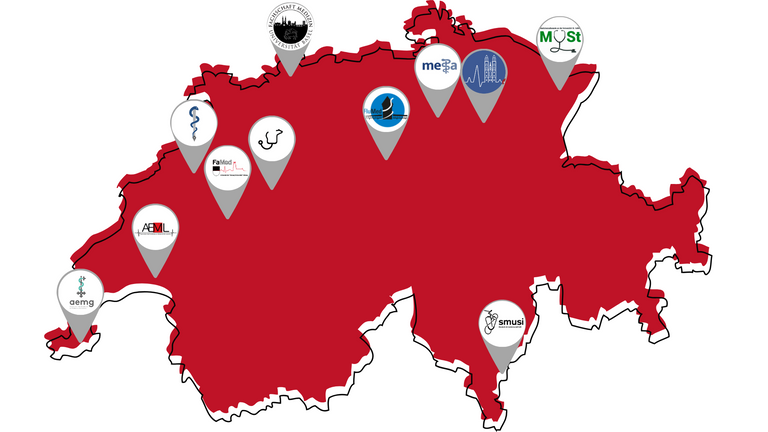
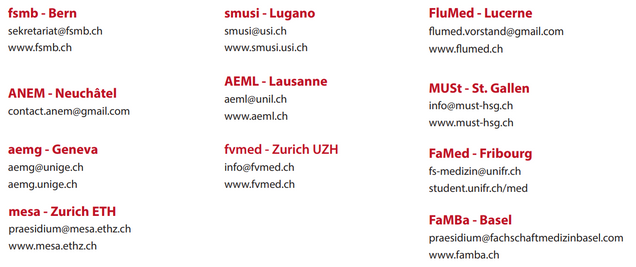
55
swimsa
meet swimsa‘s associate members!
Are you a passionate medical student ready to make a difference on a global scale? Look no further than swimsa – your gateway to an inspiring world of collaboration, innovation, and impact through our associate projects!
At swimsa, we believe in the power of unity and exchange. That's why we offer committed medical students like you a dynamic platform to connect, share ideas, and drive change both nationally and internationally.
Unleash Your Potential
Locally initiated projects blossom into national and international endeavors through swimsa. With our support, innovative ideas can evolve into impactful projects that transform healthcare landscapes.
Empowerment through Education
We're not just about projects – we're about people. Dive into our range of training courses designed to enhance your soft skills, foster leadership, and ignite creativity. Connect with like-minded peers, learn from industry experts, and unleash your full potential.
Connect Globally
Join us on the international stage! Present your projects at the General Assemblies of the IFMSA and engage in enriching exchanges with students from around the world. Together, we can amplify our impact and shape the future of global healthcare.
Your Voice Matters
As a part of swimsa, your voice matters. Each project has a vote at delegates' meetings, ensuring that your opinions and ideas shape the direction of our organization. Together, we are stronger.
Meet Your Coordinator: Need guidance or support? Our Vice President for Internal Affairs (vpi@swimsa.ch), is here to coordinate projects and empower you every step of the way.
56
swimsa
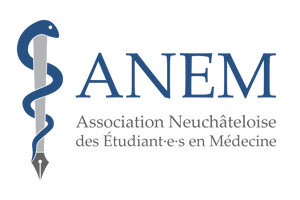
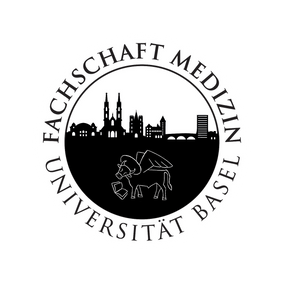

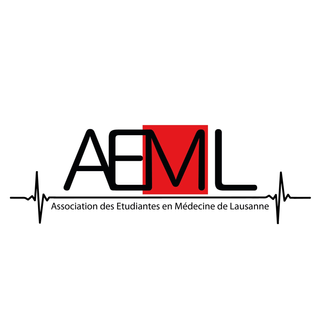
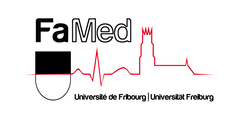
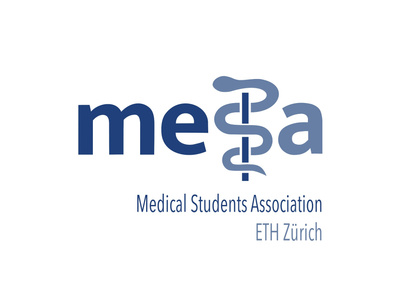
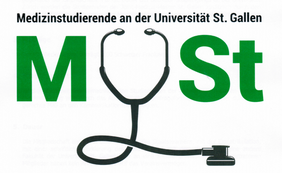



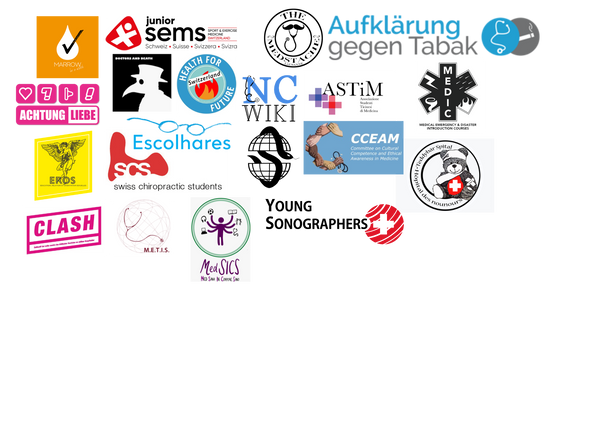
this is your local student council
these are our associate members
for all the medical students at your university. They organize social events, parties, represent you to your faculty and fight for your medical education.
which work on different public health and human rights topics. You can join any project you like or even start your own.
this is you
a medical student in Switzerland

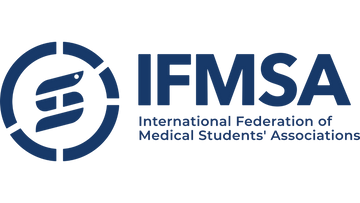

this is your national organisation
... and this is how we change the world together
swimsa is the umbrella organization for all Swiss medical students. Its members are 11 student councils and the local projects. In the committee for education, swimsa works towards an improved education on a national level. Via the IFMSA, it enables worldwide student exchanges. Twice per year, it organizes the SMSC-Conference with students from all parts of Switzerland. Visit www.swimsa.ch for more information!
The International Federation of Medical Students’ is the umbrella organisation for all the national associations of more than 120 different countries worldwide. They gather twice per year in the General Assembly (GA), where 1000 students come together and exchange ideas. swimsa is always represented by a Swiss delegation, which you can be part of as well! Visit www.ifmsa.org for more information!
